droit law F[O]CUS
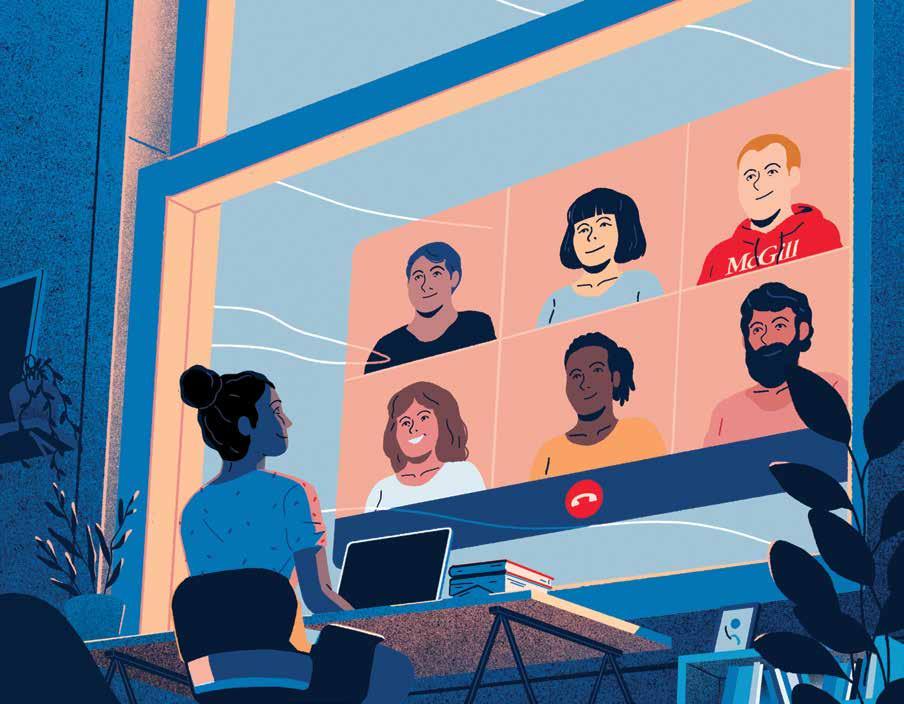
2021-2022
À l’avant-garde du droit Inspiring legal leadership for global challenges
EN CHEF

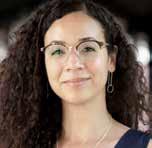


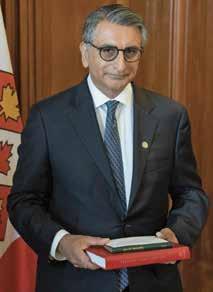

Focus Law / Droit est publié par l’équipe des communications de la Faculté de droit de McGill. Faculté de droit Université McGill 3644, rue Peel Montréal (Québec) H3A 1W9 www.mcgill.ca/law ebulletin.law@mcgill.ca

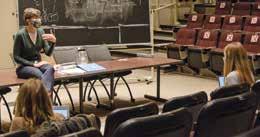
In this issue EN VEDETTE 6 Plaider pour l’excellence 12 A fight for justice 14 Three alumni breaking ground in the tech world 16 Alumni leadership in senior roles 22 Aperçu d’une année universitaire unique et solidaire 28 Mahmud Jamal’s journey to the Supreme Court of Canada À LA FACULTÉ 2 Nouvelles de la faculté 3 Academic renewal: Presenting four new Faculty members 8 A look at McGill Law Focus Week 9 Meet Kimberly Lee-Louis, Assistant Dean (Inclusion – Black & Indigenous Flourishing) 18 McGill Law in the time of COVID-19 24 Leading in law across time: McGill enters its third century 30 Les Pavillons Chancellor-Day prennent du beau ALUMNI COMMUNITY 11 Leading a push for progress in policing 26 Le laboratoire du droit transsystémique 32 Collation des grades virtuelle pour la promotion du bicentenaire 33 Highlighting our McGill Alumni Association winners 34 A commitment to equity, diversity and inclusion at McGill Law 35 Remembering Professor Emeritus William Foster 36 Alumnotes 45 Chancellor Day Circle
Serge
PAGE
Graphic Design 2021-2022 droit law F[O]CUS
18 3 28
RÉDACTRICE
Claire Loewen EDITORIAL ADVISORY BOARD Lysanne Larose Robert Leckey Brian Peebles Heather Powers CONTRIBUTORS Suzanne Bowness Julia Dyck Lysanne Larose Jean-Benoît Nadeau Johan Papin PHOTOGRAPHES Owen Egan Lysanne Larose PROOFREADERS
Lamarre Angelo Mandato DESIGN ET MISE EN
Steven McClenaghan McGill
Cover illustration by Johan Papin
11
Dean’s Word
by Dean Robert Leckey OWEN
As I reflect on the past academic year and look ahead to 2021–22, three words come to mind.

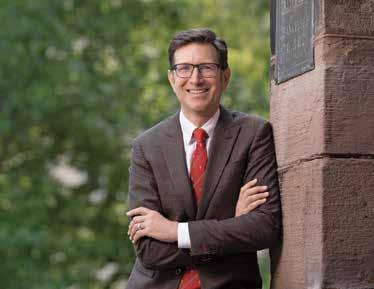
I feel gratitude to our professors and staff for their extraordinary efforts, working from home, to run the Faculty of Law during an academic year under pandemic conditions. I’m grateful to our students for their general understanding, tolerance, and good humour as we advanced tentatively on what was, for most of us, the new terrain of remote teaching and learning. And I’m deeply appreciative of our loyal alumni community for your generous expressions of support be it financial, as by contributing to our record-breaking #McGill24 day of giving, or moral, including those of you who took up our invitation in winter 2021 to share advice and encouragement with students. I’m grateful, too, that many alumni took up opportunities for virtual engagement with us and with one another, fortifying our community’s bonds. C’est avec détermination que mes collègues et la communauté étudiante de la Faculté poursuivent leurs efforts pour l’amélioration de l’accès à la justice. Ces efforts comprennent l’engagement de la faculté envers les études et l’éducation autochtones et la lutte contre le racisme anti-Noir. Bien qu’affectant tout le monde, les coûts humains et économiques de la pandémie ont aggravé les inégalités, notamment dues à la race, au genre, à l’appartenance autochtone, au statut d’immigration et à la classe sociale. Concrètement, un risque accru au quotidien s’imposait à l’entourage des membres de la communauté étudiante et du personnel issus de certains groupes. Tout en reconnaissant cette réalité et la présence continue de la violence genrée,
du racisme anti-asiatique, de l’antisémitisme et de l’islamophobie, la Faculté fait des progrès. L’ajout du cours de traditions juridiques autochtones au cursus de la première année ainsi que l’embauche d’une doyenne adjointe (équité — épanouissement des Noir.e.s et des Autochtones) sont des avancées importantes. Or, il reste du travail à faire, et nous continuons d’apprendre ensemble.
I feel optimism as we rediscover our collective academic life on campus. I believe we’ll keep some new technological tools in our kits and act on a deepened appreciation for the opportunity of being together. Unprecedentedly, we essentially welcomed two cohorts to Chancellor Day Hall incoming students and those who completed a first year on Zoom. Moreover, as I see the local and global challenges confronting us, I’m more convinced than ever of the distinctive strengths and value of McGill’s legal education. We equip our students to address problems that cross many boundaries and involve rules from many sources and to deal with uncertainty.
C’est donc avec gratitude, détermination et optimisme que nous ferons face aux défis que le futur nous réservera. J’ai hâte d’en discuter avec vous, que ce soit au Pavillon Chancellor-Day ou ailleurs.
Dean and Samuel Gale Professor of Law
LE MOT DU DOYEN
1
@DeanLeckey
EGAN
Faculty News
Rankings
McGill Law was ranked the 25th best law school worldwide in the 2021 World University Rankings by Subject published by Quacquarelli Symonds (QS).
Monographies et rapports
• Le professeur Jonas-Sébastien Beaudry: The Disabled Contract: Severe Intellectual Disability, Justice and Morality (Cambridge University Press, 2021).
• La professeure Adelle Blackett: Everyday Transgressions: Domestic Workers’ Transnational Challenge to International Labor Law (Cornell University Press, 2019). Gagnant du Prix du livre savant de 2020 du Conseil canadien de droit international.
• Le professeur Ignacio Cofone: Policy Proposals for PIPEDA Reform to Address Artificial Intelligence Report for the Office of the Privacy Commissioner of Canada.
• Le professeur Omar Farahat: The Foundation of Norms in Islamic Jurisprudence and Theology (Cambridge University Press, 2019).
• Le professeur René Provost: Rebel Courts: The Administration of Justice by Armed Insurgents (Oxford University Press, 2021).
• Le professeur Lionel Smith: Waters’ Law of Trusts in Canada, 5 th edition. (Carswell, 2021)
Le professeur Sébastien Jodoin, titulaire de la Chaire de recherche du Canada sur les droits de la personne, la santé et l’environnement, a lancé le projet Disability-Inclusive Climate Action Research Program (disabilityinclusiveclimate.org). La professeure Nandini Ramanujam servira à titre de coinvestigatrice dans le cadre du programme.
La professeure Adelle Blackett, Ad E, MSRC, a été nommée présidente du nouveau Groupe de travail sur la révision de la Loi sur l’équité en matière d’emploi du Canada par la ministre du Travail en juillet 2021.
Professors Helge Dedek and Geneviève Saumier were elected titular members of the International Academy of Comparative Law (IACL). Head librarian Daniel Boyer, Ad E, and professors
Allison Christians, Alicia Hinarejos and Marie Mainikis were elected as associate members.
Lors de la cérémonie de Collation des grades du printemps 2021, le professeur Fabien Gélinas, Ad E, a reçu le Prix David Thomson pour la supervision et l’enseignement aux cycles supérieurs de l’Université McGill. À la même occasion, le professeur Helge Dedek s’est vu décerner le Prix John W. Durnford d’excellence en enseignement par l’Association des étudiant.e.s en droit.
Professor Frédéric Mégret and Professor Nandini Ramanujam were named co-directors of the Centre for Human Rights and Legal Pluralism (CHRLP) in February 2021 for a three-year mandate, replacing Professor François Crépeau, Hans & Tamar Oppenheimer Chair in Public International Law.
Professor Daniel Weinstock began a three-year term as Associate Dean (Research) on 1 September 2021. He succeeds Professor Allison Christians, H. Heward Stikeman Chair in the Law of Taxation, who completed a four-year term in the role.
Le professeur Lionel Smith a été reconduit à la chaire Sir William C. Macdonald pour un nouveau mandat de sept ans à partir du 1er mai 2021.
Recrutement, nominations et promotions
Associate Professor Priya Gupta, Assistant Professor Joshua Nichols and Full Professor Darren Rosenblum joined the Faculty in August. Sarah Riley Case, LLM’13, joined us as a Boulton Junior Fellow and will transition to Assistant Professor in 2022-2023. Meet them on page 3.
Helge Dedek et Yaëll Emerich ont été promus au rang de professeur titulaire. Jonas-Sébastien Beaudry et Sébastien Jodoin ont accédé au poste de professeur associé.
Kimberly Lee-Louis, BCL/LLB’13, joined the Faculty in May 2021 as the inaugural Assistant Dean (Inclusion – Black & Indigenous Flourishing). Read more on page 10.
Brittany Williams, BCL/LLB’19, took on the role of Acting Assistant Dean (Admissions & Recruitment) in December 2020, replacing Andra Syvänen, BCL/ LLB’14, during her leave.
Le professeur Robert Leckey, BCL/ LLB’02 et titulaire de la Chaire Samuel Gale, a été reconduit dans ses fonctions de doyen. Son second mandat de cinq ans a pris effet le 1er juillet 2021.
Professor Rosalie Jukier agreed to continue serving in her role as Associate Dean (Academic) for an additional year until August 2022.
2 FOCUS LAW / 2021-2022 / M C GILL UNIVERSITY NOUVELLES DE LA FACULTÉ
Academic Renewal: Meet four new faculty members
Nous vous présentons fièrement les quatre nouveaux membres de notre corps professoral.
PRIYA GUPTA joined the Faculty as an associate professor in August after completing a year-long term as a Senior Wainwright Fellow. She conducts research in financial capitalism and cities, property law, and race. Gupta joined McGill from Southwestern Law School. She holds a PhD in law from the London School of Economics.

What fascinates you about property, public international law, and critical race theory?
Throughout my academic career, I have pursued research in property, race, urban governance, and international law & development with the idea that I could as a legal scholar contribute to literature that exposes how law and governance often perpetuate inequality despite frequent attempts to achieve the opposite. This motivation has informed my research in different ways: to study different jurisdictions, to integrate political-economic and historical contexts into legal analysis, and to pay attention to the role of courts and municipal governance bodies in justifying certain patterns of distribution. I have explored these themes in a number of jurisdictions, including the United States, Canada, the United Kingdom, and India, as well as transnationally.
Quels sont vos objectifs dans votre nouveau rôle?
Je suis très impatiente de faire la connaissance du corps étudiant et de travailler ensemble sur des projets de recherche et de plaidoirie. J’ai lancé un groupe de lecture sur le droit et la race cette année et je suis ravie de continuer avec ce groupe dans les années à venir. Je suis également très enthousiaste à l’idée de vivre à Montréal et d’explorer son architecture, sa musique, ses librairies et ses restaurants à mesure que la pandémie s’atténuera.
3
NOUVELLES DE LA FACULTÉ
JOSHUA NICHOLS joined the Faculty as an assistant professor in August. An expert on the constitutional relationship between Canada and Indigenous peoples, he will contribute to the Faculty’s commitment to expand the place of Indigenous legal traditions in its curriculum. He holds a PhD in law from the University of Victoria and a PhD in philosophy from the University of Toronto.
What excites you most about joining McGill Law?
I am joining a truly innovative and interdisciplinary community of scholars who focus on developing a deeper appreciation of the critical implications of legal pluralism and transsystemic law. McGill Law has taken a leading role in Indigenous and Aboriginal legal scholarship. Many questions in this area of scholarship are leading to a re-examination of the histories of legal concepts that can be so familiar that they seem to exist outside of history. McGill’s pluralist and transsystemic approach truly nurtures cutting-edge scholarship on Indigenous political and legal issues.
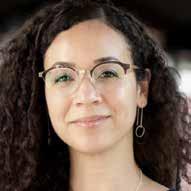
Comment avez-vous développé votre champ d’intérêt académique?
Ma carrière universitaire et mes intérêts en recherche ont été, en grande partie, façonnés par mon expérience en tant qu’Anishinabé/Métis aux racines mixtes. J’ai grandi à Peace River, une petite communauté riche en ressources située au nord-est de la ColombieBritannique; c’est pourquoi les projets d’exploitations de ressources à grande échelle me préoccupent. Les gens qui vivent à proximité de ces projets sont confrontés à de sérieux défis sociaux et environnementaux; à mesure que ces industries continueront de croître et de s’étendre, le système juridique devra chercher à résoudre ces problèmes.

SARAH RILEY CASE, LLM’13, began a one-year term as Boulton Junior Fellow in August and will transition to assistant professor in August 2022. Riley Case completed an SJD at the University of Toronto where she was a Trudeau Foundation doctoral student. She aims to develop research connected to history, repair, justice, race, legal theories, the natural world, law reform, art, and international and domestic law.
D’où
votre intérêt pour la théorie critique de la race et le droit international?
Ma famille est originaire des Caraïbes, où les intimités de la racialisation, du droit international et de la lutte anticoloniale sont très claires. Le droit international était complice de la traite transatlantique des esclaves qui a façonné ma famille et le monde. Les activistes anticoloniaux ont également cherché et continuent
de rechercher l’autodétermination par le droit. Mon intérêt pour la théorie critique de la race et le droit international découle de l’héritage de ce passé qui se poursuit, non seulement dans les Caraïbes mais au Canada, un État colonial de peuplement, où la dépossession des peuples autochtones, l’esclavage, le travail sous contrat et d’autres injustices sont devenus les fondements pour l’oppression raciale d’aujourd’hui.
FOCUS LAW / 2021-2022 / M C GILL UNIVERSITY 4
émane
NOUVELLES DE LA FACULTÉ
L’enseignement de la théorie critique de la race et du droit international me permet d’explorer, avec les étudiant.e.s, les pratiques juridiques qui ont produit cette oppression, sous le voile de la neutralité de l’État. Cela nous permet aussi d’imaginer un tout autre état de choses.
Which legal questions are you currently interested in?
My research crosses domestic and international frames, the natural world and social theory, life and law. I am currently finishing a revisionist history of how international law on climate change came to be from
a Third World perspective. I am also developing new projects that address Black histories and futures in Canada. I am particularly interested in understanding how Black communities from the 19th century onward have sought representation under Canadian law, while also refusing this law in a self-assured way. This, in turn, raises questions about ties to the land (places and resources in the natural world) and solidarity with Indigenous peoples.
DARREN ROSENBLUM joined the Faculty as a full professor in August. Their scholarship focuses on corporate governance on diversity initiatives and remedies for gender inequality. In 2018, they were a Senior Wainwright Fellow at the Faculty. They hold a JD from the University of Pennsylvania Law School and a Masters in International Affairs from Columbia University.
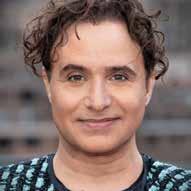
What led you to consider corporate governance through the lens of diversity initiatives and remedies for sex inequality?
I started my research career writing the first legal analysis of queer theory and continued with work on LGBT rights questions. When I became a full-time professor, I began to focus on gender equality because, even in 2004, it seemed to me these issues would remain knotty beyond questions of lesbian and gay equality. In the past few decades, the corporate sector has amassed wealth unknown in the history of humanity. How we choose to regulate firms including their treatment of underrepresented groups figures among the most challenging policy debates of our time. Forthe past twelve years, I’ve been focusing on quotas in corporate governance. These quotas until recently focused on including women on corporate boards, but we are seeing the focus shift to underrepresented racialized groups and LGBT people.
Y a-t-il des objectifs particuliers que vous cherchez à atteindre en vous joignant à McGill?
Mon objectif est d’intégrer mes travaux et mes intérêts à ceux de la Faculté. Ma recherche a toujours eu une dimension transsystémique et comparative. J’escompte donc enrichir ma recherche et celle d’autres universitaires dans des domaines connexes, y compris en dehors de l’université au sens large. Récemment, j’ai publié mes travaux en français et j’ai hâte d’approfondir mes engagements d’expression orale et d’écriture francophone. Enfin, j’ai très hâte d’entrer en contact avec les diplômé.e.s et les étudiant.e.s de la Faculté de droit de McGill.
5
Plaider pour L’EXCELLENCE
par Jean-Benoît Nadeau
Marc James Tacheji ,
BCL/LLB’12
UNE OCCASION À NE PAS MANQUER
Marc James Tacheji a assumé le rôle d’entraîneur au Concours Pierre-Basile-Mignault pour deux raisons : « Pour le plaisir d’enseigner, déclare-t-il, et parce que ma participation à ce concours comme étudiant fut une expérience inoubliable ».
Mina Chamsi , BCL/LLB’12 LA RICHESSE DE LA RÉFLEXION

Mina Chamsi est toujours épatée par le niveau d’implication des participants au Concours JuliusAlexander-Isaac. « Pour rédiger leur mémoire, ils sacrifient presque toutes leurs vacances des Fêtes », raconte l’avocate au gouvernement ontarien, qui agit comme entraîneuse depuis 2017.

Ce concours, qui porte sur des questions de droits de la personne, est dans l’air du temps. « Ceux qui ont préconisé les droits humains ont quand même conçu un droit qui leur ressemblait. Il faut le repenser pour l’appliquer à des personnes de la minorité. C’est ce qui fait la valeur de ce tribunal-école. Le simple fait d’avoir ces conversations avec les étudiants est un enrichissement », dit l’avocate qui entretient les relations bien après le concours.
Comme elle vit à Toronto, le côté virtuel imposé par les mesures sanitaires l’a assez peu embêtée puisqu’elle travaillait déjà à distance avec les participants de McGill. « De toute façon, le processus juridique bouge dans cette direction pour des raisons pratiques. Il est intéressant de voir le droit se moderniser. »
« Comme entraîneur, on apprend beaucoup. Les jeunes sont incroyablement créatifs devant un problème. Ça se voit au concours lui-même, où chaque équipe aborde la question d’une manière différente ».
L’avocat au cabinet Fasken à Montréal encourage les étudiants à participer à ce genre de concours. D’abord parce que c’est un « principe de réalité » pour ceux et celles qui travaillent fort dans leurs livres pour réussir aux examens. « Et aussi parce qu’on ne peut pas surestimer l’importance de l’apport des praticiens auxquels ils seront exposés ».
Il donne en exemple son équipe, qui a pu profiter de la gentillesse du juge Enrico Forlini, qui l‘a invitée à s’exercer au palais de justice, mais aussi des juges Marie-Josée Hogue de la Cour d’appel et Bernard Synnott de la Cour supérieure du Québec, et du plaideur émérite Marc-André Fabien. « Ce sont des pointures qui donnent du temps : ça fait une très grosse différence dans une formation ».
Marc James Tacheji était coentraîneur au concours de plaidoirie Pierre-Basile-Mignault avec Michael Shortt, BCL/LLB’13, et Camille Duguay. Leur équipe (Victor Fahey, Lara Itani, Félix-Antoine Pelletier, Pouyan Zabihian) s’est classée au 2e rang pour le mémoire, 2e meilleur tandem (Félix-Antoine Pelletier, Pouyan Zabihian) et meilleur plaideur (Félix-Antoine Pelletier).
Mina Chamsi était entraîneuse de l’équipe de McGill au Concours Julius-Alexander-Isaac. Les membres de l’équipe étaient Theresa James, Olivia Huynh, Tareq Shahwan, Olivia Ma et Vincent Yagayandi.
FOCUS LAW / 2021-2022 / M C GILL UNIVERSITY 6
NOUVELLES DE LA FACULTÉ
Les concours de plaidoirie sont une formidable occasion d’apprendre pour les étudiants et pour leurs entraîneurs. Rencontre avec quatre membres de notre communauté diplômée qui ont accepté de jouer ce rôle pour s’impliquer et se ressourcer!
Catherine Mathieu
TISSER DES LIENS
(doctorante)
Maintenant professeure de droit administratif à l’UQÀM depuis juin, Catherine Mathieu s’ennuiera de ses quatre années comme entraîneuse de l’équipe de McGill au Concours Laskin.


« On suit les participants de septembre jusqu’au concours en mars », raconte l’ex-avocate au cabinet Woods, qui trouve très gratifiant de voir évoluer les étudiants. « Entre l’ébauche du mémoire et sa version finale, l’amélioration est phénoménale. La courbe d’apprentissage est très abrupte ».
Elle explique qu’elle suit la carrière de ceux qu’elle a entraînés. « Il s’agit d’étudiants exceptionnels, prêts à fournir un gros effort en dehors de leur zone de confort. On les a guidés dans la rédaction du mémoire, dans la préparation de la plaidoirie, dans les entraînements avec des avocats et des juges, dans la gestion du stress. Ça crée des liens forts. »
Elle admet toutefois que la version virtuelle du concours en 2021 l’a laissée un peu sur sa faim, car il y manquait les éléments qui se rattachent à une compétition en présentiel. « C’est plaisant d’aller à Toronto ou à Winnipeg, d’être reçu par la faculté hôtesse. Mais mieux vaut le faire en virtuel que de ne pas avoir de concours du tout ».
Fortunat Nadima Nadima , BCL/LLB’17 LA FIERTÉ DE L’ENTRAÎNEUR
Quand on lui a proposé de devenir entraîneur pour le Concours Harold G. Fox, Fortunat Nadima Nadima a sauté sur l’occasion. « Quand j’étais étudiant, ma participation à un tel concours avait été l’une de mes expériences les plus marquantes à la Faculté ». L’avocat de chez Norton Rose Fulbright est très fier des quatre étudiants « motivés et brillants » qu’il a entraînés pendant six mois. « On les guide pour les aider à trouver un style efficace de rédaction et de plaidoirie. Mais comme les questions de fond du concours traitent de problèmes qui ne sont pas encore réglés, on apprend en même temps qu’eux ».
Catherine Mathieu était coentraîneuse avec MariePierre Cloutier, BCL/LLB’13, au Concours Laskin. Leur équipe (Marie-Denise Vane, Catalina Karam, Elise Malenfant et Nathaniel Reilly) est arrivée 1re au classement général, meilleure équipe appelante et meilleures finalistes (Marie-Denise Vane, Elise Malenfant); meilleure équipe intimée et 2e meilleurs finalistes (Nathaniel Reilly, Catalina Karam); meilleur plaideur individuel (Nathaniel Reilly); 2e meilleure plaideuse individuelle (Elise Malenfant); 3e meilleure plaideuse individuelle (Marie-Denise Vane); et finalement 2e place pour les mémoires.
Cette année, les concours se passaient en mode virtuel, ce qui affectait la capacité des étudiants de « lire » l’auditoire, selon l’entraîneur. « Il y a le défi technique et celui de l’isolement, mais d’un autre côté, ça représente la direction que le droit va prendre. Donc, si on peut affronter maintenant ce type d’audience, ça ne peut qu’aider ».
Fortunat Nadima Nadima espère bien répéter l’exercice, d’autant que cela peut servir au recrutement de candidats. « Avec les années, on s’éloigne un peu de la Faculté. Les concours permettent de renouer des liens ».
Fortunat Nadima Nadima était coentraîneur avec Claudette van Zyl, BCL/LLB’16, et Sofia Lopez-Bancalari au Concours Harold G. Fox. Leur équipe (Alice Wang, Zachary Bensemana, Michelle Pucci, Yasmine Shadman) s’est classée deuxième pour la coupe Harold G.Fox. Alice Wang a remporté le prix Donald F. Sim du meilleur plaideur à l’oral. Michelle Pucci et Alice Wang ont reçu le prix Gordon F. Henderson qui récompense la meilleure rédaction de factum.
7
Focus on success
by Suzanne Bowness
For Sidney Black-Rotchin (1), a BCL/JD student in her final semester, the chance to be immersed in the world of self-represented litigants not only allowed her to explore an area of interest, but helped sharpen her thinking for a term essay she was writing.

The opportunity presented itself during Focus Week, a program launched by the Faculty in 2017 that offers optional, week-long intensive courses on subjects ranging from entrepreneurship to policy analysis to technology. In October and February, regular upperyear classes are suspended for a week. Focus Weeks are sponsored by the McCarthy Tétrault Fund for Innovative Legal Education.
This year marked Black-Rotchin’s third time taking advantage of the mid-semester offerings. She had previously taken Focus Week workshops on migration and negotiation skills, the former to sample an international law topic, and the latter for hard skills development.
“It’s an opportunity to sample an interesting topic that I’m unsure about I can try it before committing a semester to studying it,” she says.
In the workshop on self-represented litigants, which is so popular it has been offered multiple years running, Black-Rotchin learned from practitioners who were passionate and knowledgeable.

“I figured it would be handy to pick one that would overlap with the content of my paper, which focused on the harmful psychological impacts of engaging with the civil justice system in Canada, and how litigation stress can act as a barrier to access to justice. The Focus Week course ended up really being helpful. I cited a lot of the cases,” says Black-Rotchin.
Professor Rosalie Jukier (2), Associate Dean (Academic), BCL’83, LLB’83, is a key organizer of Focus Week. She says the program originated as a way to offer learning about topics that were not covered elsewhere in the program. Today, five workshops are offered per session, with 20 to 25 students in each. Students are graded on a pass/fail basis.

“It’s a short-term investment, and a real opportunity to gain a different perspective, to learn from alumni or community members in the field. It’s very positively received by students. Our Focus Week courses are full every term,” Jukier says.
The Faculty began offering a summer version of Focus Week in 2020, when the pandemic cancelled many students’ internships and other opportunities.
FOCUS LAW / 2021-2022 / M C GILL UNIVERSITY 8 NOUVELLES DE LA FACULTÉ
Focus Week allows students to take crash courses on new topics and dive deeply into others through instruction from experts in their fields.
1 2
Connecting with students
Interest in Focus Week has grown within the alumni and wider legal community, Jukier says. More and more instructors are eager to connect with students by offering a workshop.
One such instructor is Sonia Struthers (3), BCL’87, LLB’87, a partner with McCarthy Tétrault, who taught a Focus Week course in October 2018 and again in 2020. She teamed up with McCarthy colleagues and guest presenters from the business community to teach “Anatomy of the Deal,” which centres around mergers and acquisitions.


Struthers says being an instructor allows her to pass along knowledge and skills which are helpful to beginning lawyers. These include business evaluation methods, project management, and team client service, all skills she wishes she’d had earlier in her career. It also allows her to fulfil her own interest in teaching, and to get to know soon-to-be lawyers.
“A full course is a big commitment, so this is the perfect format,” Struthers says.
For Dessislav Dobrev (4), a senior legal counsel for the World Bank Group, teaching a recent Focus Week course afforded the opportunity to fulfil a passion for academia and pass along his knowledge on artificial intelligence (AI). Dobrev’s Focus Week curriculum focused on deep discussions about the benefits and challenges of this emerging technology.
“The course is intended to equip students with the tools necessary to be prepared for the incoming AI wave,” says Dobrev, noting that he believes AI will bring about profound change on the practice and regulation of law.

McGill and now co-teach a Focus Week course, “Thinking like an innovator.”
They first taught their Focus Week course in February 2020 and did so again remotely in 2021. In addition to sharing ideas on topics such as innovation, productivity, project management and process improvement, they like to show students that there are many paths to explore with their law degrees.
“We like to share an alternative path. Many go to law school to practise law, but there are a ton of interesting things that you can do in law in addition to practice,” says David Skinner.
Karen Skinner adds that their course also prepares young lawyers by showing them a mix of hard and soft skills that are helpful when starting out. Indeed, Black-Rotchin agrees that one of the best benefits of Focus Week is that the courses use different approaches from traditional ones.
“I find the way we’re evaluated is always different, and the courses allow for quite a bit of exploration and reflection,” she says.
9
Karen Dunn Skinner, BCL’93, LLB’93, and David Skinner (5), BCL’91, LLB’91, are partners in life as well as in their consultancy Gimbal Lean Practice Management Advisors. They met at
4 5 3
Bridging the gap: Kimberly Lee-Louis
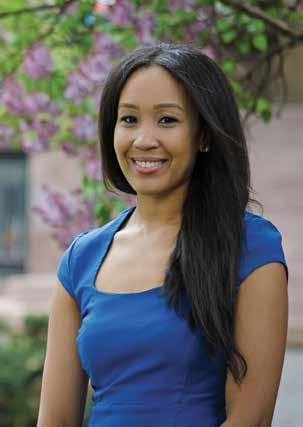
As the inaugural Assistant Dean (Inclusion – Black & Indigenous Flourishing), Kimberly Lee-Louis, BCL/LLB’13, will play a leadership role in the Faculty’s collective efforts towards recruiting and supporting Black and Indigenous law students. With a background that combines education, public interest and social services, Lee-Louis will collaborate with students, professors and administrative staff to implement McGill’s Action Plan to Address Anti-Black Racism, and its Equity, Diversity & Inclusion Strategic Plan 2020–2025 within the Faculty and its surrounding communities.
How does it feel to be the first person to occupy this role, and what do you hope to bring to it?
I am elated! I am excited about the work and the chance to engage with students, faculty and staff to come up with a collaborative strategy as to how we can have a more inclusive environment and education at McGill Law. As a graduate of the Faculty, it feels like coming home. I bring with me the same objectives I had going into law school as a multiethnic, multilingual woman.
I wanted to be able to understand the system to be able to help myself and others navigate it better. I am aware of the issues in Montreal when it comes to racialized communities, Indigenous communities and Inuit communities, and of the barriers to accessing information and resources.
I am interested in combining what we learn in academic settings and the reality on the ground in a practical way for people who need it.
Comment votre expérience dans les domaines de l’éducation, du droit, de la santé, entre autres, vous sera-t-elle utile dans ce rôle ?
Grâce à mon expérience, je suis en mesure de travailler étroitement avec les personnes concernées et d’aborder les problèmes à partir d’une perspective intersectionnelle. Quand on parle d’éducation inclusive et d’appartenance au sein de la Faculté, il est utile de comprendre la multiplicité des expériences qu’y vivent différentes personnes. Il est important d’examiner ces problèmes à travers leur prisme et leur vision du monde.
Why do you think this new position is an important one?
Even though the position is new, the concerns are longstanding. It’s timely that the position was created given the broader socio-political climate. Especially in this generation of students, there’s a greater awareness. They are vocalizing their concerns directly to the institutions and bringing them to the forefront.
10 FOCUS LAW / 2021-2022 / M C GILL UNIVERSITY
NOUVELLES DE LA FACULTÉ
Leading a push for progress in policing
by
Alain Babineau has had a unique career, the latest chapter of which has brought him to the City of Montreal, where he serves as an advisor and expert on racial and social profiling.
A former police officer with decades of experience, Babineau holds degrees and certificates in criminology, legal studies, conflict resolution, police management and, most recently, BCL/JD diplomas from McGill Law.
After 27 years with the RCMP, Babineau began working with the Center for Research-Action on Race Relations in 2016, where he advocated for victims of racial and social profiling by police.
In his work with the City, Babineau will assist public safety agencies, such as the police and public transportation, in implementing recommendations from a report on systemic racism and discrimination published by Montreal’s public consultation office last year. The report detailed racism and discrimination across municipal institutions, including in public safety agencies.
This means Babineau will be diving head-first into a polarizing debate on the role of public security agencies in la métropole.
“Over the last four years, I’ve been hearing from the community about racial profiling, which is a very important piece,” says Babineau. “The missing voice here is that of law enforcement officers.”
As a Black man, Babineau has had direct experience with racial profiling. He admits to having both practised it and been a victim of it. Now, his job is to prevent it from the ground up.
Through conflict resolution training, Babineau developed the ability to mediate difficult situations. At McGill Law, he pushed this skill further, learning to analyze situations from multiple perspectives.
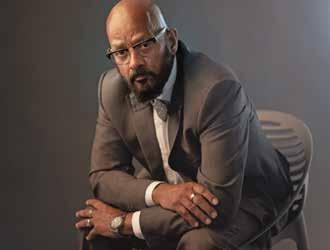
“Law school gives you a different, analytical way of looking at things, where you consider all sides,” says Babineau. “That’s one of the things we’re not always very good at as people, including as law enforcement officers.”
Teaching officers to weigh all sides of a situation in a nuanced manner is key to preventing racial profiling, Babineau believes. That is why he is interested in implementing the Insight Policing method, a conflict resolution-based communication skillset that aims to prevent escalation. It helps police officers get to the root of challenging interactions and to understand the people they are engaging with.
“We don’t do much of that in policing. We don’t really take the time to find out why people are feeling a particular way in a given situation, or why they’re behaving a certain way,” Babineau explains. “That creates problems and leads to situations of conflict that don’t need to happen.”
This behaviour can cause incidents to degenerate into horrific scenarios, he adds.
When it comes to combatting racial profiling, Babineau is more interested in changing legislation than practising law. To him, this means garnering enough public and political support to effect change.
It can take years for complaints and lawsuits to move through the justice system. Even then, justice is not guaranteed. For Babineau, the fact that Derek Chauvin’s trial for the murder of George Floyd occurred just one year after the incident was a rarity and is one example of how public support is an important agent of change.
“We need sustainable changes. You can sanction misbehaviour, but you can’t legislate goodwill,” he concludes. “It has to come from a change in the culture; a change in the mindset.”
11 ALUMNI COMMUNITY
Alain Babineau, BCL/JD’20, discusses his new role with the City of Montreal, and how listening and conflict resolution are key to law enforcement reform.
Claire Loewen
A FIGHT FOR JUSTICE
 by Claire Loewen
Members of the McGill Law community step up for trans, non-binary and intersex Quebecers
by Claire Loewen
Members of the McGill Law community step up for trans, non-binary and intersex Quebecers
FOCUS LAW / 2021-2022 / M C GILL UNIVERSITY 12 ALUMNI COMMUNITY
On a cold day in late January, tears were shed when the Superior Court delivered its judgment in Centre for Gender Advocacy v Attorney General of Quebec. The court declared six provisions of the province’s Civil Code unconstitutional for violating the equality rights of trans non-citizens, trans youth, intersex people, trans parents and non-binary people in Quebec. It was a long-awaited and hard-fought victory for trans, non-binary and intersex people, and those advocating for their fundamental rights.
Indeed, D Tourki, a former advocate and public educator at the Centre for Gender Advocacy, spent years fighting for the rights of trans people in Quebec. She coordinated research projects, organized marches, published articles and spearheaded the lawsuit, with the Centre for Gender Advocacy as the lead plaintiff, alongside four co-plaintiffs. Tourki’s activism focused on trans noncitizens and migrants.
Notably, no fewer than nine of the lawyers involved in the case were McGill Law alumni, a testament to the faculty’s longstanding commitment to social justice and sensitivity to law’s effects on marginalized people.
Among these alumni were lead counsel for the Centre for Gender Advocacy and the individual plaintiffs, Audrey Boctor (1), BCL/LLB’05, of IMK LLP; Michael Lubetsky, BCL/LLB’09, Joseph-Anaël Lemieux, BCL/LLB’16, and Faiz Lalani, BCL/ LLB’14, of Davies Ward Philips & Vineberg (for intervener Egale Canada Human Rights Trust); Geeta Narang, BCL’00 (now a Superior Court judge), and Julien Delangie, BCL/ LLB’16, then of Narang & Associés (for intervener Coalition of LGBT + Families); along with Michel Bélanger-Roy, BCL/ LLB’17, and Jérémy Boulanger-Bonnelly, BCL/LLB’15, of Norton Rose Fulbright (for intervener Gender Creative Kids). While the litigation was substantially successful, the judge rejected two claims, regarding parents’ ability to block a change of name application by a trans youth aged 14-17 and the requirement to always designate the male or female sex in birth registration. The challengers and defending government have appealed aspects of the judgment.
Tourki recalls a bittersweet feeling when the decision was rendered. “It was a very happy moment, but after a few days, you start to realize that you had to go to court to correct documents that recognize people’s identities. This should have been done a long time ago,” Tourki said. “Many people were stripped of basic rights for too many years.”
After working on the case alongside McGill Law alumni including Boctor co-plaintiff Samuel Singer (2), BCL/LLB’09, LLM’11, a law professor at the University of Ottawa Tourki was herself inspired to study law. She enrolled in the first year of the BCL/JD program the next year.

“I attended the trial and developed a passion for the legal work,” Tourki said. “Audrey and Sam were very supportive. The fact that Sam and other advocates have studied law has paved the way for others, like me.”
“The victories in this decision are the result of decades of advocacy work by community members,” said Professor Singer, a long-time advocate for trans rights. “We are grateful to our trans, non-binary, and intersex supporters and advocates, our allies, our lawyers, and our friends for their dedication to fighting for our rights.”
In June, Singer received the Canadian Law and Society Association (CLSA) Article Prize for his paper “Trans Rights Are Not Just Human Rights: Legal Strategies for Trans Justice,” which argues that human rights law is only one of many legal tools necessary to address the legal challenges facing trans people. The article appeared in a special issue of the Canadian Journal of Law and Society on the theme, “On the Margins of Trans Legal Change,” funded by a Social Sciences and Humanities Research Council connection grant secured by Dean Robert Leckey, with Singer as co-applicant. The special issue includes an introduction co-authored by Leckey, an article co-authored by Tourki, and an article by Florence Ashley, BCL/LLB’17, LLM’20.

“Trans, non-binary, and intersex communities have been fighting for equality for such a long time, and this case is really part of that though it is by no means the end,” Boctor said, adding that she felt fortunate to work with the Centre for Gender Advocacy, the individual plaintiffs, experts, fact witnesses, interveners and their counsel.
“There was so much expertise and experience to draw upon and everyone worked incredibly hard. The courage of the witnesses and the presence of so many community members in the courtroom every day was also incredibly motivating. I am very proud of what we all accomplished together.”
13 1 2
Three alumni breaking ground in the tech world
 by Julia Dyck
by Julia Dyck
After five years of working in management consulting for McKinsey & Company, Eytan Bensoussan, BCL/ LLB’10, MBA’10, realized it was time to begin his own business journey. He cofounded North One, a financial technology company offering a fast deposit account built for small businesses, start-ups and freelancers across America.
Bensoussan wrote the bar exam but never practised law, although his legal education and experience in the field helped him build his innovative career. “My time at McKinsey exposed me to these massive shifts in technology that were changing the way that banking was being developed and consumed around the world.”
He always thought that a legal education would be an advantage in the business world. The rigorous thinking and ability to assess large amounts of information that are fundamental to a legal education has been extremely valuable to his endeavours in the tech sector. During his time at Chancellor Day Hall, he took the time to get to know his professors, including Rod Macdonald, Tina Piper and Helena Lamed, and says their ongoing support has encouraged him to continue forging his path outside the practice of law.

FOCUS LAW / 2021-2022 / M C GILL UNIVERSITY ALUMNI COMMUNITY 14
A McGill Law degree is a valuable asset for a wide range of career paths. Focus Law / Droit spoke with three innovative alumni who are using their legal education to embark on innovative professional endeavours.
Yuan Stevens, BCL/LLB’18, works as Policy Lead on Technology, Cybersecurity & Democracy at the Ryerson Leadership Lab, a fitting outlet for the unique and specialized knowledge she honed during her time at McGill Law.
With music and education degrees in hand, Stevens chose to study law in order to expand her career potential, although she wasn’t planning on becoming a lawyer. Stevens knew she was interested in the intersection between technology and law, and sensed a need for more expertise in this domain.
Stevens recognizes the importance of her transsystemic education when working on issues that are not constrained by jurisdiction, such as the internet. Among her recent accomplishments, she notes her work on facial recognition technology and its use
by the RCMP, relying on her analytical and boundarycrossing skills to shed light on the ways tech companies and law enforcement are taking advantage of weak legal regimes in Canada.
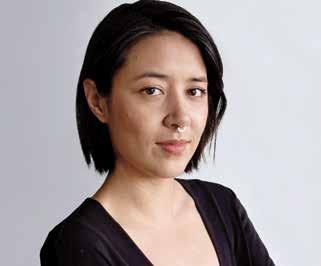
“Canada needs more people with legal and tech knowhow, especially from the communities who stand to be the most affected by the harms resulting from the use of technology, including people of colour, queer people, disabled people, etc.” Stevens said. “There’s a need for people with that expertise and I hope that McGill Law is a place that develops those leaders.”
Less than one year ago, mid pandemic, Saam Mashhad, BCL/LLB’17, left his job in commercial litigation at Norton Rose Fulbright to cofound EvenUp. The start-up is building technology that determines the potential value of personal injury lawsuits. EvenUp uses this information to provide low-cost litigation financing for plaintiffs and deploys it in software that helps lawyers build automated demand packages for personal injury claims.

Various writing projects and entrepreneurship classes at McGill supported the development of Mashhad’s bold ideas, and gave him the technical knowledge that has been crucial in the fast-paced environments of both law and business. His education also allowed him to “think in a structured way about inherently uncertain problems with uncertain solutions, and develop some comfort around this uncertainty.”
Mashhad is grateful for and proud of his engagements on different files during his time working a firm. While he notes that taking the leap towards entrepreneurship was not easy, he is thrilled to be building his own successful business, securing venture capital and hiring his own team. He’s excited about the future of legal technology, seeing significant opportunities for tech in the hands of lawyers and its potential to have a direct and positive impact on the general public and in people’s everyday lives.
15
ALUMNI LEADERSHIP IN SENIOR ROLES
by Suzanne Bowness
SONIA KESHWAR
While Sonia Keshwar, BCL’96, LLB’96, and Gordon Cruess, BCL/LLB’07, may hold positions in different roles, industries, and even countries, both leaders share a path that led them to success in roles spanning business, finance, operations and law. Another commonality? Both still use daily the tools they began developing during their time at McGill Law.

Keshwar is Vice-President of Special Initiatives, Compliance and Ethics for OMERS, the $105 billion pension plan that invests in Canada and globally on behalf of more than half a million municipal employees in Ontario. Cruess is Senior Vice-President and Associate General Counsel for General Atlantic, a global growth equity investor in New York. They spoke to Focus Law / Droit about the challenges and triumphs of their wide-ranging careers.
After graduating, Keshwar worked in private practice at McMillan and Torys in Toronto before changing lanes and becoming General Counsel of a publicly traded start-up. “The strong technical, client relationship and deal management skills I learned from the terrific lawyers and clients I worked with in private practice served me well in subsequent roles,” she said. “In my later years at Torys, I was doing a lot of deals for a financial services client working in tandem with the business from the earliest stages of the deals, and became interested in an in-house position with a significant business component.”
Operating at the intersection of law and business
Keshwar did not know where her career would ultimately lead, but attending law school was always her plan. At Chancellor Day Hall, Keshwar broadened her understanding of what she could do with a legal education through extracurriculars and part-time work. “I liked all my courses, but I particularly enjoyed the opportunities to participate in the Jessup moot, lead the International Law Society, and work part-time in an international trade law boutique,” she recalled.
Joining the Investment Industry Regulatory Organization of Canada (IIROC), Keshwar used her legal training in a series of legal and operational roles, which included managing the investment dealer dispute resolution program, overseeing the launch and operation of stock exchanges and marketplaces, assessing dealer business plans and transactions, leading regulatory consultations, and assuming operational leadership of a new regulatory function. “These were roles that I never would have expected or even known were possibilities as a student,” said Keshwar.
16
FOCUS LAW / 2021-2022 / M C GILL UNIVERSITY FEATURE
Celebrating two alumni who have found success across sectors
Keshwar’s position at OMERS brings together her interest and experience in business, operations, public policy, law, and regulation. “There are endless interesting issues, deals, projects and opportunities to stretch, learn and grow, and to lead and support others,” said Keshwar. “Our work ultimately benefits municipal employees from across the province fire fighters, paramedics, public health and children’s aid workers and others who spend their careers in public service. The sense of purpose is shared across OMERS.”
The legal skills Keshwar started developing at McGill remain useful in her current position. “My legal background helps me address our business and operational challenges and has proved a strong foundation for multi-disciplinary roles. This broad perspective influences my talent management, mentorship and sponsorship activities. I look forward to continued learning and growth, and to supporting the next cohort in achieving their potential.”
After several years practising in mergers and acquisitions, first at Cravath and then at Paul, Weiss, Cruess made the move to General Atlantic in 2015. The work he does in-house is broader and more strategic, and involves more moving pieces than the discrete elements of transactions that he handled at a firm, noted Cruess.
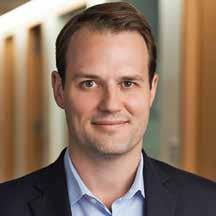
“At a firm, M&A lawyers focus on transaction diligence and execution. In-house, you are living with your portfolio companies through the investment’s full life cycle. As investors who are generally in a minority position, backing companies that are growing quickly, promoting alignment and addressing key risks is core to what we do. I work with our deal teams to come up with the appropriate diligence plan, and to negotiate structure, rights, governance and exit provisions with the portfolio companies and law firms involved. After we invest, I frequently work with portfolio companies directly on all manner of issues and am typically very involved in exit planning and execution when that time comes,” said Cruess.
The work is fast-paced in a corporate environment, he said. “Our business is growing dramatically and the pace of our investment has increased, particularly as COVID-19 has reinforced the importance of our core themes like digitization. We invest in leading growth companies around the world, and have to be very flexible and creative,” he said. A big difference between working at a law firm and working in-house is the time it takes to fully understand the business you work for and the businesses you are investing in, and educating colleagues about their legal options and risks, Cruess added.
Thinking outside the box
Cruess found his calling in a first-year contracts class taught by Professor Rosalie Jukier, BCL’83, LLB’83. “She made contracts incredibly exciting,” he recalled. “It didn’t take long to figure out that private contracts were the most interesting and challenging area of practice for me. They’re like very complicated puzzles, and it’s fun to put them together.” Cruess also spent a semester at Sciences Po in Paris and credits McGill Law’s international perspective with awakening him to the possibility of launching his legal career in New York.
Working in New York with graduates from top law and business schools, Cruess has reflected on the quality of education and opportunities afforded by McGill Law. “People who excel at McGill can compete with anybody. It’s a rigorous, challenging environment, and the quality of people McGill attracts is worldclass. I think we’re taught to think outside of the box and creatively, given the nature of the transsystemic program,” said Cruess.
17
GORDON CRUESS
McGill Law in the time of
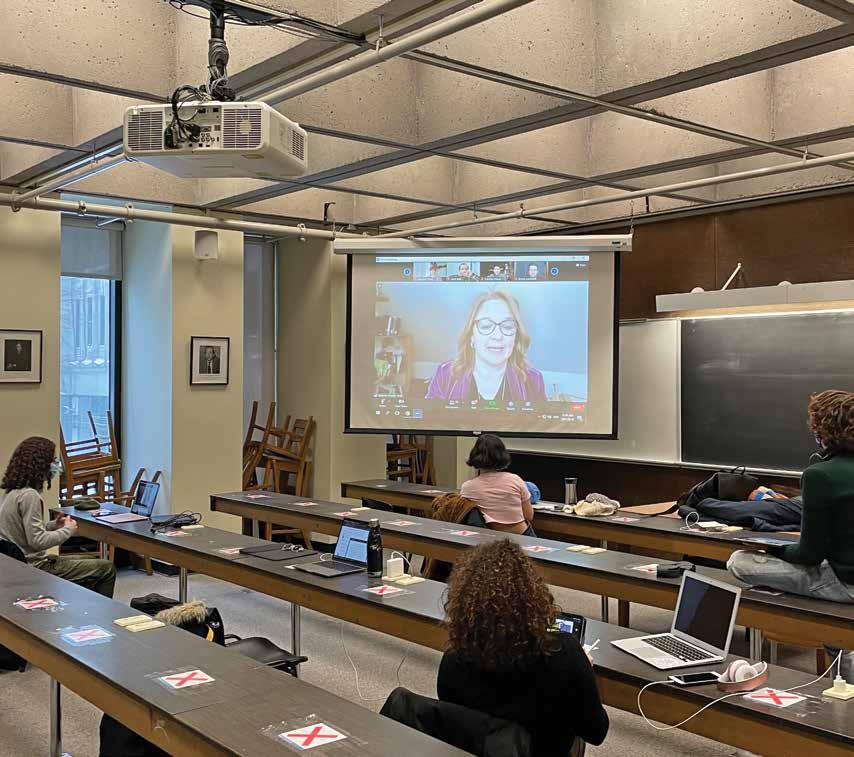
FOCUS LAW / 2021-2022 / M C GILL UNIVERSITY 18 NOUVELLES DE LA FACULTÉ
COVID-19
For the first time, the Faculty of Law carried out the majority of the 2020–2021 academic year away from McGill’s campus. As the pandemic pushed everything from classes to events to extracurriculars online, students, professors, and staff came together remotely to ensure the Faculty’s vibrant intellectual life continued during a most uncommon year. Through creativity, hard work, empathy, and the magic of Zoom, the McGill Law community proved up to the challenge.
Défis et réconforts
L’adaptabilité et l’ingéniosité ont été à l’ordre du jour tout au long d’une année inusitée.
Les défis se sont présentés même avant la semaine d’orientation à l’automne, a déclaré Beatrice Courchesne-Mackie (1), présidente de l’Association des étudiant.e.s en droit de premier cycle (AÉD) en ’20-’21. Afin de faciliter l’engagement et l’interaction au sein de la nouvelle cohorte, l’AÉD a su créer un groupe Facebook dédié dès la fin de l’été pour partager des ressources, informations et mèmes.

L’adaptation virtuelle s’est poursuivie au cours du semestre, avec des évènements phares tels que les soirées Coffeehouse et les Mardis Mokas livrés de façon hebdomadaire et dans des circonstances nettement moins susceptibles de provoquer des plaintes de bruit. Au-delà de ses classiques, l’AÉD a organisé des soirées Trivia, des évènements d’artisanat et des cours d’exercice aux deux semaines sur Zoom. Avant la période d’examen d’avril, ils ont même envoyé des colis de bien-être aux étudiant.e.s.
« Malgré les défis, nous avons été à la hauteur, déclare Courchesne-Mackie. L’exécutif de l’AÉD a fait preuve de beaucoup de créativité pour garder vivant l’esprit communautaire. Je pense également que certaines des innovations que nous avons dû apporter, étant donné la nature virtuelle des choses, se sont avérées incroyablement bénéfiques et seront reconduites dans les années universitaires à venir ».

L’Association des étudiant.e.s de cycles supérieurs en droit (GLSA), présidée par Atagün Mert Kejanlıoglu (2), a été confrontée à des défis similaires. Le taux de participation aux activités virtuelles était souvent faible, peut-être un symptôme de la fatigue numérique, et la création d’un sentiment de communauté s’est également avérée difficile, notamment pour les étudiants internationaux, qui constituent une grande partie des cohortes LLM et DCL.
Cependant, la tenue d’évènements sur Zoom a permis à la GLSA d’organiser un panel sur les opportunités de carrière avec des personnes détentrices d’un DCL œuvrant hors Québec. Son colloque annuel, organisé sous le thème « Le droit et la ville », a permis à un nombre record de 80 personnes sur cinq continents de présenter leurs recherches au cours de deux jours! Le séminaire Doyen Maxwell et Isle Cohen en droit international a eu lieu au cadre du colloque.
« Nous avons certainement ressenti le manque de présentiel. C’est la rencontre entre les gens qui fait que notre colloque annuel est si spécial, et cela nous a rappelé notre impatience de retrouver nos collègues au Pavillon Chancellor-Day », explique Kejanlıoglu. À la lumière de ces défis, la Faculté a fait tout son possible pour faciliter le succès des membres de son corps étudiant, près ou loin du campus.
La Faculté a déployé des « espaces flexibles » dans certaines salles de classes pour le travail individuel ou en petits groupes, disponibles sur réservation. Les étudiant.e.s se sont montrés enthousiastes quant à la possibilité d’avoir un espace de travail autre que celui de leur domicile.
La Faculté a par ailleurs offert du financement pour combler certains coûts technologiques imprévus engendrés par l’apprentissage à distance, que ce soit des webcams, des microphones, des batteries d’ordinateurs portables ou des forfaits internet plus performants.
19
1 2
Student wellness in the face of global uncertainty

The Faculty’s Local Wellness Advisors, Shrabani Debroy (3) and Heleen Loohuis (4), faced the partic ularly difficult task of providing virtual support and guidance to students who were watching a global tragedy unfold as they juggled their studies.



“It was scary at first because we needed to adapt very quickly and nobody knew how this pandemic would play out,” Debroy confides. The second LWA position was made possible by a gift to the Faculty.

Students reported struggling with increased depression, as well as loneliness, loss of motivation, and anxiety. The uncertainty and instability that came with COVID-19 were also difficult, with students wondering how the pandemic might affect their careers. Some students had trouble keeping up with academic work due to Zoom fatigue, Debroy explains. Despite these heavy challenges, Debroy shares that she is extremely proud of students for doing their best to succeed academically during such a collectively challenging period.
“Law school is hard enough in normal times, and some of our first-year and graduate students moved to Montreal during a lockdown. They barely had a chance to make friends, yet managed to get through the year during a global pandemic. That is resilience!” Similarly, the Student Affairs Office (SAO) was tasked with adapting to students’ needs remotely. Advising services transitioned to virtual platforms with a multitude of time slots each week. The SAO engaged with students by holding several photo contests, asking them to share recipes or photos of their pets to receive small prizes such as McGill Law face masks.
The SAO also launched a podcast, Ask the SAO, featuring conversations with professors, staff, student representatives, and even Minister of Justice & Attorney General the Hon. David Lametti, BCL’89, LLB’89. It also created two charming team videos to lighten the mood and connect with students.
“Even in the midst of the pandemic, we strove to sustain our engagement with 1L students to ensure an enriching, memorable and ‘true to life’ start to law school,” says Nancy Czemmel (5), past Manager of Student Affairs (now with the Schulich School of Music).
FOCUS LAW / 2021-2022 / M C GILL UNIVERSITY 20 NOUVELLES DE LA FACULTÉ
3 4 5
The legal field beyond the pandemic
The pandemic also came to bear on students’ professional intentions. A number of students who had summer or articling positions lined up in 2020 saw their offers rescinded or had their start date pushed back. Meanwhile, the sudden shift to remote work at most law firms heightened others’ concerns about their ability to build rapport during virtual interviews as part of recruitment processes.
As a result, the Career Development Office (CDO), whose resources were significantly expanded in 2019 thanks to the generosity of the Class of ’93, organized a series of workshops and events around themes like virtual networking and job searching in turbulent times.
“With some guidance and reassurance, and no small measure of their own determination, students were able to bounce back and adapt to the new reality,” says Sophie Roy-Lafleur (6), BCL/LLB’11, Director of the CDO. Roy-Lafleur adds that prioritizing students’ mental health became crucial to the CDO’s advising approach, a practice the team intends to continue beyond the pandemic.
Alumni also provided support for students from a distance. Ahead of McGill24 in the winter term, dozens of graduates, ranging from the class of ’66 to the class of ’20, generously submitted notes with words of encouragement and reflections on what helped them navigate through difficult situations during their time as a student or in the early stages of their career.
The appetite for a McGill legal education has not been dimmed by the current crisis. Indeed, Acting Assistant Dean (Admissions & Recruitment)

Brittany Williams (7), BCL/LLB’19, reports that applications to the BCL/JD program this year increased by more than 25 percent and the Faculty welcome yet another exceptional cohort of students in September. It will be in the past when people are reading it.

There is no doubt that the pandemic has had a profound, and in many ways disparate, impact on the McGill Law community. While it may yet take some time for the full scope of this impact to become clear, there are already many lessons that can be drawn from the experience of the past year, whether it be an increased use of technology in teaching, a heightened emphasis on student wellness, or a general appreciation of the importance of human connections. Clearly, the 2020–2021 year is not one that will soon be forgotten.

21
“ Some students barely had a chance to make friends, yet managed to get through the year during a global pandemic. That is resilience!”
6 7
- Shrabani Debroy, Local Wellness Advisor
Aperçu d’une année universitaire unique et solidaire
Faculty, staff and students share short reflections of their experience teaching, learning and working under exceptional circumstances during the 2020–2021 academic year.
Malgré l’avènement de « Zoom University », ma connexion avec la Faculté et les autres étudiants est resté intacte : en plus de ménager mes efforts pour organiser des évènements virtuels, je suis resté en contact avec mes plus proches amis de la Faculté.
Simon Filiatrault, 3L, ILADA Co-President
Who knew that I’d get to know individual students despite being separated by a screen, that learning could be effective while students interacted virtually, and that a class spirit could emerge in the face of the isolation and challenges of COVID-19?


Prof. Rosalie Jukier, Associate Dean (Academic)
My fellow students and I drew strength from “solidarity in the time of distancing.”
Prof. Nandini Ramanujam, Co-Director, Centre for Human Rights and Legal Pluralism

My 1L professors developed particularly creative ways to address the challenges posed by the pandemic; the Faculty’s tireless commitment to providing an engaging virtual learning environment made for a truly special and memorable year!
Connor Hasagewa, 1L

I thought 1L would have the largest learning curve in law school, but the past year came with its own challenges. Staying in touch with 1L friends, and participating in activities such as the LEX Program and the Canadian National Negotiation Competition helped me through the year. I look forward to being on campus next year, when I won’t have to ask, “Can you hear me now?”
Ariel Holmwood-Bramwell, 2L
En début d’année, deux étudiants, pianistes professionnels, ont gentiment accepté de partager des extraits de concert avec la classe de droit constitutionnel. Le but était d’apporter un peu de douceur, de beauté et de lien social entre nos multiples petites cases Zoom. Un jour, problème de wifi : je dois fermer ma caméra et changer de pièce. À mon retour trois minutes plus tard, un étudiant avait spontanément pris sa guitare et jouait pour ses camarades. J’ai compris qu’on commençait à « faire communauté », un élément pédagogique tellement essentiel.
Prof. Johanne Poirier Chaire Peter MacKell sur le fédéralisme


Writing a doctoral thesis is a once-in-a-lifetime experience. Although it has been very challenging and lonely, I am grateful for those moments of debating an idea with my partner, or finding inspiring authors from different times and places.
Ling Chen, DCL candidate

Amidst this insanity, I have found the strength and the energy to work on my thesis in one thing: the fact that I feel part of an academic community that is eager to understand and transform social inequalities. This keeps me hopeful.
Maria Ceballos-Bedoya, DCL candidate

NOUVELLES DE LA FACULTÉ FOCUS LAW / 2021-2022 / M C GILL UNIVERSITY 22
Challenging, different, difficult, inspiring... This year was like no other for McGill Law. However, we prevailed, and the energy of our community helped bring us together, letting our imaginations run wild – and organizing the biggest GLSA conference in history!
Miroslaw Sadowski, DCL candidate
What is the Matrix? A prison of the body and the mind. Mais tant qu’il y a de la vie, il y a de l’espoir. Ceux-ci furent parmi les thèmes de mes cours de droit pénal cette année. Confined to a digital landscape, my students resiliently explored the evolution of criminal law, prisons, and beyond. Our class discussions were stimulating, and our memories will live on.
Prof. Mugambi Jouet
This year will be an unforgettable one for both pedagogical and personal reasons. While it is great to have longer periods of uninterrupted reading time, I learned that I took for granted the brief moments in between class, events and meetings in the atrium, hallways, and library to catch up with classmates. I’m learning to cherish all events and those in-between moments.
Khadija Ahmed, 2L 2021 winner of the Centre culturel islamique de Québec Memorial Award


Despite the challenges of studying online, our professors sought to ensure our well-being. While it might have been easier to teach us as boxes on a screen, we were welcomed with compassion and humanity, creating an environment conducive to our growth.
Audrey Poulin, 1L
I have so much respect, love, and compassion for all of our students who had the pressure of excelling academically while living through this global crisis.
Shrabani Debroy,
Local Wellness Advisor

Despite all the mishaps, with the help of the Faculty members and the staff, graduate students managed to push through the year, and completed this academic year successfully.
Atagün Kejanlioglu, DCL candidate, past President, Graduate Law Students’ Association


McGill Law’s unique strength is its community, and community fosters a stronger legal education. While this year was incredibly difficult in many ways, I think it would have been more difficult had it not been for our community, which kept in contact virtually.
Beatrice Courchesne-Mackie, 3L past President, Law Students’ Association


23
Leading in law across time: McGill enters its third century
1848: Petition and establishment of the Law Faculty

McGill’s Faculty of Law was formally established in 1848, decades after the founding of McGill College in 1821. The original demand for a law faculty came from the students themselves. Led by Alexander Morris (BCL 1850, DCL 1862), 23 students reading law for the Bar of Canada East petitioned the Vice-Principal to create a complete law program. When Charles Dewey Day became the Principal of McGill College in 1853, he quickly moved to formally establish the Faculty of Law. In 1855, William Badgley was appointed as its first Dean.
1955 : Bref passage de Leonard Cohen

L’auteur-compositeur-interprète Leonard Cohen, LLD’92, n’a passé qu’un semestre à la Faculté de droit après avoir décroché son baccalauréat ès arts à McGill. Il a eu pour professeur F. R. Scott, qui est resté son mentor même après son passage à l’université. Scott a prêté à Cohen le chalet à North Hatley où ce dernier a travaillé sur son premier roman, Jeux de dames (The Favourite Game). Leonard Cohen dira plus tard que F. R. Scott lui avait donné « le courage d’échouer » à l’époque où, jeune écrivain, il appréhendait de quitter l’entreprise familiale de vêtements.
1968 : Le Programme national voit le jour

Mis sur pied pendant le décanat de Maxwell Cohen, qui souhaitait créer un programme bilingue et bijuridique, le Programme national a été offert par la Faculté de 1968 à 1999. Ce programme permettait aux étudiant.e.s d’obtenir un diplôme en droit civil ou en common law, et d’acquérir l’autre diplôme avec une année d’études supplémentaire. Établi en 1999, le programme intégré actuel est enseigné de manière transsystémique et mène tous ses finissant.e.s à un double diplôme en droit civil et en common law.
1998: Inauguration of the Nahum Gelber Law Library
Following provincial budget cuts in the 1990s, libraries across campus were struggling financially. A fundraising initiative was launched that raised over $13 million in donations. In 1998, the Nahum Gelber Law Library opened its doors, offering students more seating, private study rooms, and beautiful natural light. The library currently hosts a collection of over 220,000 volumes of statutes, regulations, law reports, treatises, books, journals and other legal materials.

NOUVELLES DE LA FACULTÉ FOCUS LAW / 2021-2022 / M C GILL UNIVERSITY 24
As McGill celebrated its 200th birthday in March, the Faculty of Law launched its bilingual Bicentennial website. Through a timeline featuring over 200 photos, viewers can discover the Faculty’s tradition of innovation and leadership in legal pedagogy, our commitment to public service, and the evolving diversity of our community. Visit our Bicentennial site at 200.mcgill.ca/faculties/law
1912: The LSA is founded
The Law Students’ Association was founded in 1912 as the Law Undergraduate Society. The 1898 version of Old McGill shows earlier signs of a law students’ society 14 years prior, noting at the time that “[a] long step forward was taken when the Law men formed themselves into a society governed by a settled constitution.”
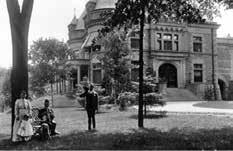
1914-1938:
L’arrivée des femmes, de personnes noires et autochtones à la Faculté
En 1914, Annie MacDonald Langstaff est devenue la première femme à obtenir un diplôme en droit de McGill. Cette première a inspiré nombre de femmes à obtenir leur diplôme en droit, à lutter pour les droits des femmes et à demander accès au Barreau du Québec. La même année a vu le déclenchement de la Première Guerre mondiale. Plusieurs jeunes étudiants de la Faculté sont partis au front, sans revenir, dont Angus Splicer, le premier étudiant autochtone connu de la Faculté. Durant cette même période, la Faculté a accueilli de nombreux vétérans, des femmes et ses premiers étudiants noirs.
1948: Finding a home in Chancellor Day Hall
Old Chancellor Day Hall (OCDH) was previously known as the Ross Mansion, named after James Ross, who made his fortune in the railway business and had the house built in 1890. OCDH was donated to McGill in 1948 by J.W. McConnell, another well-known philanthropist who had acquired the house. With this donation to McGill, the Faculty finally found a permanent home for the first time in its hundred-year history and was renamed Chancellor Day Hall in honour of Charles Dewey Day.
2006: Founding of the Black Law Students’ Association of McGill
The Black Law Students’ Association of McGill (BLSAM) is the oldest Quebec chapter of the Black Law Students’ Association of Canada. BLSAM’s mission is to “to promote the needs and concerns of Black law students to the general public and legal community,” as well as to “build a dialogue with the community and increase access to legal education for persons who identify as African Canadian/Black.”
2020: Cours de première année en traditions juridiques autochtones
Les cours de justice pénale et de droit des biens (deux cours obligatoires d’un an) incorporent désormais des notions de droit autochtone. La Faculté a aussi établi un nouveau cours obligatoire de première année sur les Traditions juridiques autochtones, inauguré en automne 2020.

25
Stay tuned on our social media pages for future Bicentennial events.
LE LABORATOIRE DU DROIT TRANSSYSTÉMIQUE
par Jean-Benoît Nadeau
Jean-Philippe Brisson, BCL’96, LLB’96, peut se vanter d’avoir été l’assistant de recherche du professeur Paul-André Crépeau en personne. En plus de collaborer à ses recherches, Brisson l’aidait dans la mise à jour de ses notes de cours. « Il a été pour moi un mentor. Il connaissait ma femme. Il m’a conseillé sur mes orientations de carrière et mes lieux d’études. »
Brisson est maintenant associé et coprésident mondial en matière de réglementation environnementale et de droit transactionnel chez Latham & Watkins à New York. Il est passé à McGill quelques années avant que la Faculté adopte formellement l’enseignement transsystémique, même si celui-ci était implicite dans la pensée du professeur Crépeau. « Je dois beaucoup à la méthode de pensée acquise à McGill. » Cette rigueur lui a permis, notamment, de réussir plusieurs transitions, dont notamment entre la Banque mondiale, la Communauté européenne et un cabinet new-yorkais. « C’est un tremplin. »

« Au début de ma carrière, le droit en matière de changements climatiques était surtout réglementaire, mais il est devenu très contractuel sous l’effet des produits dérivés, dont les crédits de carbone. C’est 90 pourcent de ma pratique. J’applique couramment des techniques dont je discutais avec le professeur Crépeau il y a 25 ans. »
Rui Gao, BCL/LLB’16, est arrivée directement du Collège Jean-de-Brébeuf à 19 ans. « Même aujourd’hui, je suis toujours la plus jeune du cabinet », s’exclame l’avocate chez Davies Ward Phillips & Vineberg à Toronto.

Elle explique avoir choisi McGill précisément pour l’approche transsystémique. « Il y a des limites à l’utilité de mémoriser des codes, des lois ou des règlements qui changent tout le temps. Je voulais davantage examiner les traditions et la structure juridique. J’étais plus dans les principes que dans le par cœur ».
Comme assistante de recherche au Centre Crépeau, elle a collaboré à un dictionnaire du droit privé comparatif en plus d’organiser une conférence de deux jours sur la « jurilinguistique », soit l’effet des mots sur le droit.
« La pratique est différente du contexte académique, mais il y a beaucoup de liens dans la manière de faire sa recherche. Par exemple, comment utiliser un principe de droit déjà formulé pour l’appliquer sur une question nouvelle pour laquelle il n’existe aucune jurisprudence ? L’approche transsystémique nous apprend à penser hors des sentiers battus ».
FOCUS LAW / 2021-2022 / M C GILL UNIVERSITY 26 ALUMNI COMMUNITY
JEAN-PHILIPPE BRISSON LE DISCIPLE
RUI GAO QUESTION DE PRINCIPES
Voici quatre personnes qui ont fait leur droit à McGill entre 1992 et 2016 — l’intervalle d’une génération. Leur point commun? Les quatre ont tour à tour fait de la recherche au Centre Paul-André Crépeau de droit privé et comparé, lequel a pour mission de développer et de promouvoir la tradition civiliste canadienne dans une perspective comparatiste. Et comme bien des membres de notre communauté diplômée, ce quatuor en a long à raconter !
Jameela Jeeroburkhan, BLC/LLB’04, est arrivée au droit en passant par l’anthropologie. « Mon intérêt était académique. Je voulais comprendre le rapport entre culture, norme et droit », dit l’avocate spécialisée en droit autochtone et associée au cabinet Dionne Schulze à Montréal.
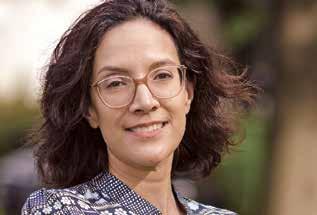
De ses six mois comme assistante de recherche au Centre Crépeau, elle conserve un souvenir inaltérable du professeur Nicholas Kasirer, BCL’85, LLB’85, désormais juge à la Cour suprême du Canada. C’était l’été où le Québec venait de créer l’union civile, alors que le gouvernement fédéral n’avait pas encore modifié sa définition du mariage. Le professeur et l’étudiante sont allés assister à la première union civile. « Il voulait que je l’aide à considérer les éléments symboliques du rituel. Participer à l’analyse anthropologique d’un principe juridique a été pour moi une expérience marquante. »
Elle explique que la capacité de penser « transsystémiquement » est inhérente au droit autochtone, en plein développement. Or, c’est un environnement « trijuridique », voire « quadrijuridique ». Car outre la Loi sur les Indiens, de la common law, et le droit civil du Québec, de plus en plus de communautés autochtones en appellent au droit international. « L’approche transsystémique nous dit qu’il n’y a pas une seule norme. C’est précisément ce que j’aimais en anthropologie. »
OLIVIER JARDA LE TOUCHE-À- TOUT
Olivier Jarda, BCL/LLB’15, considère avoir franchi un point tournant en 2e année de droit, alors qu’il était assistant de recherche au Centre Crépeau. On lui a alors confié la tâche de coorganiser un forum en l’honneur du professeur Roderick Macdonald, qui a réuni plusieurs générations issues de notre communauté diplômée et corps professoral. « Le professeur Macdonald savait créer un environnement où les gens sont à l’aise de prendre des risques. C’est emblématique de la faculté. »

Après s’être spécialisé en droit autochtone chez Hutchins Legal à Montréal, l’ex-musicien avec trois albums à son actif et boursier Rhodes a agi comme attaché politique du ministre fédéral de la Justice à Ottawa, avant de devenir directeur des politiques et des affaires juridiques au cabinet de la ministre fédérale de l’Infrastructure et des Collectivités.
« L’approche transsystémique sert aussi bien à régler des problèmes que le législateur n’a pas prévus qu’à développer de nouvelles politiques. » Il cite l’exemple du dossier sur les discours haineux pour lequel il a comparé, entre autres, les lois allemandes (de tradition civile) et australiennes (de tradition britannique).
« Ce sont des styles qui ne sont pas étrangers à un diplômé en droit de McGill ».
27
JAMEELA JEEROBURKHAN L’ANTHROPOLOGUE
Mahmud Jamal’s journey to the Supreme Court of Canada
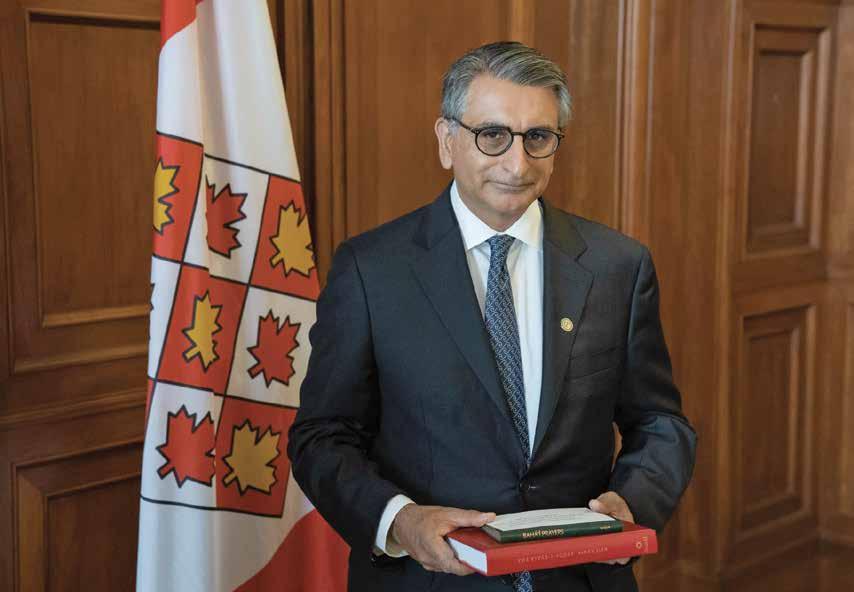 by Claire Loewen
by Claire Loewen
On 1 July 2021, Mahmud Jamal, BCL’93, LLB’93, joined two other McGill Law graduates on the country’s highest court: Justice Sheilah Martin, BCL’81, LLB’81, and former dean Justice Nicholas Kasirer, BCL’85, LLB’85. Justice Jamal’s appointment was met with resounding praise from all corners of the legal world, including his fellow alumni and colleagues. They shared why they think he will find great success as a justice of the Supreme Court of Canada (“SCC”).
FOCUS LAW / 2021-2022 / M C GILL UNIVERSITY 28 ALUMNI COMMUNITY
Long before joining the SCC, Nicholas Kasirer was a junior professor at McGill, where he recalls being “thrust in classrooms to teach the virtues of the Civil Code to sometimes skeptical and occasionally inattentive upper-year common law students,” before the transsystemic program was implemented.
“I do remember an alarmingly bright and unusually kind Mahmud Jamal in Obligations, showing special politeness to me as a novice teacher,” Kasirer told Focus. “I have every hope that he will continue to show the same patience with me in our work together in Ottawa. I couldn’t be happier to have him as a colleague.”
Azim Hussain, BCL’00, LLB’00, a partner at NOVAlex in Montreal, noted that Justice Jamal’s appointment is significant on multiple levels. It continues the long tradition of having some of the country’s best legal minds on its highest court. Justice Jamal brings a broad expertise to the SCC, from commercial litigation and class actions to constitutional and public law.
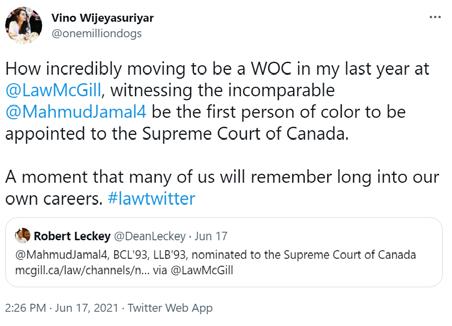
“With an increasing proportion of the Canadian population being foreign-born and having origins outside of Europe, the presence of Justice Jamal on the SCC bench will allow more Canadians to see a reflection of themselves,” Hussain said.
The immersion of McGill-trained jurists in transsystemic thinking contributes to the Court’s ability to adjudicate cases from the traditions of the civil law and the common law, Hussain added, and to ensure a continued dialogue between them.
When she heard the news, Justice Alison Harvison Young, BCL’83, LLB’83, who was Jamal’s professor in law school and his colleague on the Ontario Court for Appeal, felt a deep sense of pride. During his student days at McGill, she watched Jamal blossom academically and as a member of the McGill Law community.
“He quickly emerged as a student who, although he did not say much, was very much worth listening to when he did have a question or comment,” she said.
She described him as having compassion and a keen sense of humour. When Jamal was appointed to the Court of Appeal two years ago, Harvison Young was delighted.
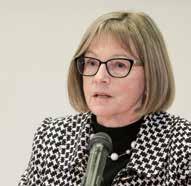
“I am sad to lose him as a colleague, but bursting with professorial pride to see him appointed to the Supreme Court. I know he will serve with distinction, and will be a superb, collegial, and compassionate member of the Court,” said Harvison Young.
(right) Justice Alison Harvison Young, Jamal’s professor in law school and colleague on the Ontario Court of Appeal.
(below) Mahmud Jamal’s graduation photo from McGill Law in 1993.
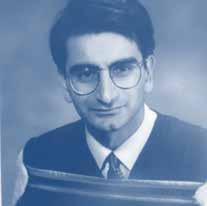
29
Les Pavillons Chancellor-Day prennent du beau
Grâce à la générosité de notre communauté diplômée, les Pavillons Chancellor-Day peuvent s’enorgueillir à juste titre de plusieurs nouvelles œuvres d’art. De plus, redécouvrez la pièce dorénavant appelée le Grand Salon Jordan H. Waxman.
Sitting Woman in Robes IV — Gift of the Estate of Mitzi and Mel Dobrin
This striking bronze statue, which now stands in the foyer of Old Chancellor Day Hall, was donated by the Estate of Mel and Mitzi Dobrin, CM, BCL’71, in March 2019.
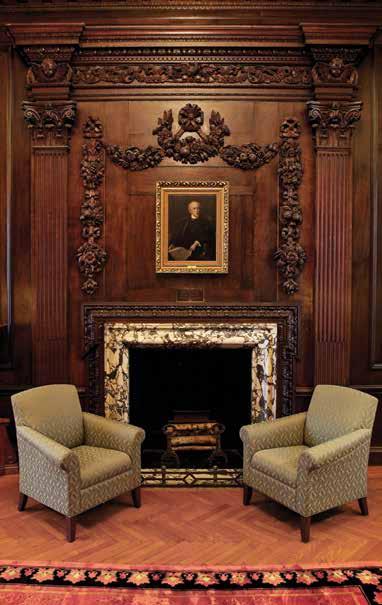
Lynn Chadwick, “Sitting Woman in Robes IV,” Edition 1/9, 1987. Donated to McGill University by the Mitzi and Mel Dobrin family. Lynn Chadwick (1914-2003) was an English artist whose work consisted of semi-abstract sculpture in bronze or steel. His work is found in the collections of the MoMA, the Tate, and the Centre Georges Pompidou. One of his sculptures adorns the entrance to the Montreal Museum of Fine Arts.
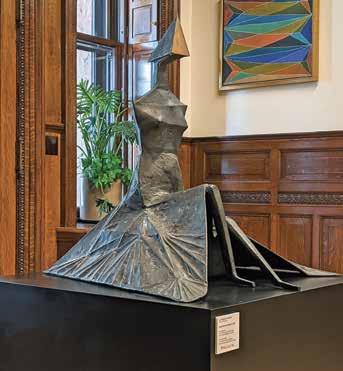
ALUMNI COMMUNITY FOCUS LAW / 2021-2022 / M C GILL UNIVERSITY 30
Jordan H. Waxman Common Room

Jordan Waxman, BA’86, LLB’91, BCL’92, has been a loyal McGill supporter since 1994. This year, the founder and managing partner of Nucleus Advisors took his commitment a step further by investing in Chancellor Day Hall’s historic and storied Common Room. For the next 50 years, the Common Room will bear Waxman’s name, and his philanthropy will support the upkeep and renovation of this beautiful space for generations to come.
“It’s an opportunity to give back and to see another generation of leaders come about inside McGill,” Waxman said. “My philanthropy is focused, first and foremost, on finding solutions that can have impact sustained over a generation or more.”
For Waxman, the gift symbolizes change and legacy all at once. As a student, he remembers enjoying Coffeehouse on Thursday nights in the Common Room, when the Cool Monsoons student band would play under the gaze of portraits of legendary jurists and academics.
“I thought, ‘Let’s remember that there is an opportunity for exploration, leadership, curiosity and fun, and also for serious academic pursuits,’” Waxman said. He expects that in McGill’s third century, sparks of ingenuity and thinking outside the box will lead to the best and most innovative outcomes.
Waxman sees philanthropy as an investment in something that impassions him not only is it fulfilling to see his gifts make a meaningful difference in education at McGill, but he hopes to inspire others to direct their energy, ideas and financial resources to the University.
“If you really commit to something you’re passionate about and you give, there is leverage in that,” Waxman said. “I encourage everyone to give early and often.”
As for the Common Room, Waxman had but one condition for his gift: that among the portraits of famous jurists, a photo of the Cool Monsoons band be permanently displayed.
The Honourable ALISON HARVISON YOUNG, BC’83, LLB’83, a judge of the Ontario Superior Court of Justice, was appointed to the Court of Appeal for Ontario. Justice Harvison Young was a University from 1988-1998, teaching in the
Lithographies inuites —
Dons de Bruno Savoie, BCL/LLB’18
Bruno Savoie, BCL/LLB’18, a fait don de deux lithographies d’artistes inuits, qui sont maintenant exposées au 4e étage du nouveau Pavillon Chancellor-Day
La première gravure, réalisée par Lucy Qinnuayuak (1915-1982), s’intitule Children Followed by Bird Spirit (1967) et provient de Kinngait, ou Cape Dorset. Dans cette œuvre, deux enfants reviennent triomphants de la pêche, chacun ayant attrapé un poisson à l’aide de son kaviak, ou lance de pêche. Un grand oiseau marche derrière eux.

La deuxième gravure, réalisée par Adamie Alaku Qaqutu (1943-1964), est intitulée Seals/Aquatic Family (1962) et montre cinq phoques se prélassant ensemble. L’inscription en dessous est le nom de l’artiste : Adamie (en haut) Alaku (en bas). Cette œuvre fait partie de la toute première collection de lithographies à émerger de Povungnituk, ou Puvirnituq, au Québec, en 1962.

31
The
Collation des grades virtuelle pour la promotion du bicentenaire
Le 11 juin, les communautés de l’Université McGill et de la Faculté de droit se sont réunies virtuellement pour célébrer la collation des grades, et cette année en particulier pour fêter la « promotion du bicentenaire ». Les juristes nouvellement titulaires de diplômes BCL/JD, LLM et DCL ont reçu un chaleureux appui familial et amical à distance à travers Zoom et YouTube.
La cérémonie universitaire, diffusée en direct sur YouTube, s’est mise en branle au son des traditionnelles cornemuses et de l’hymne de l’Université. Le chancelier Michael A. Meighan, LLD’12, la principale Suzanne Fortier, le vice-principal exécutif Christopher P. Manfredi et le professeur Madhukar Pai, Chaire de recherche du Canada en épidémiologie et santé mondiale, ont pris la parole pour féliciter la promotion de la Faculté de droit et célébrer la remarquable réussite de la cohorte finissante: avoir complété leurs études à distance en pleine pandémie. Quelle épreuve!
Après la diffusion universitaire, la Faculté a accueilli la nouvelle cohorte de notre communauté diplômée et leurs proches dans une cérémonie privée sur Zoom.
La professeure Angela Campbell a présenté le Prix d’excellence en enseignement John W. Durnford au professeur Helge Dedek. « Pour lui, les réussites de ses élèves sont les siennes. Il veille constamment aux intérêts fondamentaux de ses élèves », a déclaré la professeure Campbell.
Ensuite, la vice-doyenne professeure Andrea Bjorklund a présenté le Prix David Thomson 2021 pour la supervision et l’enseignement aux cycles supérieurs au professeur Fabien Gélinas. Elle a souligné le mentorat individualisé que le professeur Gélinas offre à ses étudiant.e.s des cycles supérieurs et son grand dossier de copublications avec ses étudiant.e.s.
Alec Sader et Bianca Marcelin ont ensuite prononcé le discours d’envoi en tant que comajors de promotion, lequel s’inspirait de la résilience de leurs camarades et de leur volonté de créer des espaces inclusifs dans la profession juridique.

« Notre souhait pour vous est que vous sortiez de cette salle pour aller rayonner dans toutes les sphères de la société qui ont besoin de vous. Vous êtes des fins en soi et votre passage à cette Faculté n’est que le début », a déclaré Bianca Marcelin.
« Si les systèmes juridiques doivent profiter à tous, alors nous et nos communautés avons besoin d’espaces où nous pouvons nous réaliser et, plus fondamentalement, nous émanciper, répandre nos idées pour cultiver la douceur que nous recherchons », a ajouté Alec Sader.
Pour conclure, le doyen Robert Leckey a salué l’engagement et la solidarité de la promotion de 2021.
« Votre temps ici a été marqué par des rappels de notre monde pour une plus grande justice, a dit le doyen. Le privilège d’une formation juridique confère la responsabilité d’honorer les voix et les esprits de ceux qui, pour une raison quelconque, sont réduits au silence. Je vous exhorte à gérer ce privilège avec sagesse ».
À la fin de la cérémonie, le doyen a invité familles et proches à prendre leurs caméras et micros pour transmettre leurs félicitations à voix haute et applaudir la réussite de cette promotion historique.
32 FOCUS LAW / 2021-2022 / M C GILL UNIVERSITY ALUMNI COMMUNITY
Highlighting our McGill Alumni Association winners
Nahum Gelber ,
Award of Merit
BA’54, BCL’57
A philanthropist with a passion for art and an enduring affinity for McGill, Nahum Gelber, CM, has supported his alma mater and its students for more than six decades. Gelber is among the Faculty’s most loyal and generous benefactors. His contribution led to the creation of the Nahum Gelber Law Library, which continues to benefit thousands of students, scholars, lawyers and the Montreal legal community.
Tina Hobday
, BA’88, BCL’93, LLB’93
Distinguished Service Award
An engaged and energetic alumna for over 20 years, Tina Hobday has served on McGill’s Board of Governors, as President of the MAA, as President of the McGill Young Alumni, and as a founding member of the Faculty of Law’s Young Alumni Board. A recognized leader in the fields of pension plan litigation and governance, she also sits on the University’s Pension Administration Committee. In recognition of her work, McGill Law honoured her with its James A. Robb Award for exemplary volunteer service in 2012.

Balarama Holness , BCL/JD’21 Chancellor Gretta Chambers Student Leadership Award
Former CFL player Balarama Holness was an outstanding student who has used his legal training, his background as an educator, and his interest in public policy to launch important conversations about social justice on campus and throughout the city. Before joining the 2021 Montreal mayoral race, Holness founded the human rights organization Montreal in Action and successfully petitioned the city to hold a public consultation on systemic racism and discrimination, mobilizing many in the McGill community to participate.

Paul Marchand , BCL’66, LLM’85 E.P. Taylor Award

Paul Marchand’s contributions to McGill span decades and exemplify the notion of giving back. He has volunteered an enormous amount of time and energy, helping to raise funds in support of the University. Marchand also played a central role in securing major donations, including a visionary $15 million gift from the Doggone Foundation that enabled the creation of the McGill Interdisciplinary Initiative in Infection and Immunity (MI4). The timely initiative harnesses the expertise of more than 250 researchers, including some McGill Law faculty members, to tackle pressing health threats such as COVID-19.
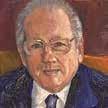
33
ALUMNI COMMUNITY
Each year the McGill Alumni Association (MAA) recognizes those who have had significant impact on alumni life, the University and the community. The Faculty of Law proudly presents its four MAA winners for 2020.
A commitment to equity, diversity and inclusion at McGill Law
McGill’s Bicentennial occurs at a pivotal moment as institutions and individuals in Canada and around the world focus increasingly on addressing the ongoing impact of colonialism, anti-Black racism and systemic discrimination. In line with its priority to create pathways to success for Black students, Indigenous students and students of colour, McGill Law is creating a fund to bolster initiatives that will tangibly support students from historically underrepresented groups over the next five years.
Outreach: Sparking the dream of a legal education
Retaining students: Providing support to flourish
The fund will be used to invest in resources that prioritize early intervention and create pathways to McGill, such as the LEX outreach program, which invites Montreal-area youth to learn about the legal profession by pairing them with McGill Law students. The Faculty will encourage more students from underrepresented groups to pursue a career in law by expanding the number of high schools and CEGEPs it partners with to support longer-term follow-up and mentorship.
To promote the academic successes of students from underrepresented groups, appropriate support services must be in place and aligned with student needs. Such services include mentorship and tutoring, paid opportunities for experiential learning and networking opportunities.
Targeted career development Community engagement: Forging connections and deepening McGill’s presence in the community
Student-driven initiatives: Empowering change in partnership with the Faculty
Equipping students with tools for their careers is critical for students from underrepresented groups, who may have difficulty seeing their place in today’s legal profession. The Career Development Office is dedicated to ensuring students from underrepresented communities can pursue their professional aspirations with confidence through CV and cover letter clinics and reviews, career counselling, and mentorship pairings with practicing professionals who share their lived experience.
McGill Law is deeply rooted in its surrounding community. From supporting membership programming at Fondation Indspire to participating on the Racial Profiling Committee at the Clinique Juridique Saint-Michel, and much more, the Faculty is dedicated to making an impact beyond McGill’s campus. Through additional community engagement, law students will be able to offer help to those in need, including refugees and first-generation Canadians.
No one is better positioned to understand the needs of underrepresented students as those students themselves. Through their dynamic student associations involving and by serving underrepresented constituencies, law students have the creativity, drive, and firsthand experience to define initiatives and programs that will help them and their peers thrive. The fund will allow the Faculty to work in partnership with students to help ensure they are empowered to define their futures.
FOCUS LAW / 2021-2022 / M C GILL UNIVERSITY 34 ALUMNI COMMUNITY
Saying “take care” to Professor Emeritus WILLIAM F. FOSTER (1943-2021)
Born in India and raised in New Zealand, Bill Foster joined the Faculty of Law as assistant professor in 1968. With research and teaching interests in tort, property law, real-estate transactions, and education law, he was promoted to associate professor in 1971 and to full professor in 1977. He was Sir William C. Macdonald Professor from 1994 until his retirement in 2011, when he was named emeritus professor. He was deeply devoted to the Faculty of Law from his arrival. A fixture for many years on the third floor of Old Chancellor Day Hall, Bill Foster is remembered for his collegiality, true friendship, generosity, kindness, common sense, fairness, and grace. It is true that he mentored younger colleagues, providing a sympathetic ear, wise career and life advice, and reassuring support. But I have now learned that “mentor” is a word used of him by a colleague senior to him as well. Colleagues remember his firm moral compass. Whether on matters of hiring or curricular reform, he invariably took a long view. He was often smiling, always spoke thoughtfully, and, when he disagreed, did so lightly and constructively.
Bill Foster valued and embraced administrative service to the faculty and university and he did it superbly.
He held three portfolios as associate dean and served as acting dean (1979–80) and interim dean (2003).
He contributed significantly to service at the university level, chairing the University Appeals Committee and the University Grievance Committee, stepping in as interim secretary-general, and serving as associate provost from 2004 until his retirement.
Bill Foster was highly active in his career beyond McGill. With his wife, Joan, Bill Foster was a pillar of their church and community. They worked closely in organizing events, fundraisers, and various activities to assist those in need.
The Faculty of Law extends its deepest condolences to Bill Foster’s family. We also express condolences to the many others lawyers, academics, judges, friends, citizens who knew and loved Bill Foster, as we did.
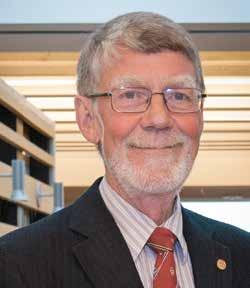
Joan Foster and their children have graciously suggested directing donations in Bill’s memory to the Faculty of Law.
Robert Leckey Dean and Samuel Gale Professor of Law
Donations can be made to William Foster’s memory at https://mcgill.ca/x/JZN
35 OBITUARY
We were deeply saddened to learn of the unexpected death of a beloved colleague and friend.
Professor Emeritus William F. Foster passed away on 10 August 2021.
Morton Bell, BCL’55
Luc Bigaouette, BCL’73
David Cohen, BCL’72
Earl S. Cohen, BCL’66
Harvey Crestohl, BCL’56
Thomas R. M. Davis, BCL’72, LLB’79
John Joseph Donohue, LLB’77
James S. F. Feng, LLM’60, BCL’66
Michael L Garmaise, BCL’63
The Hon. John H. Gomery, BCL’56
Marcel Guilbault, BCL’91, LLB’91
Stephen S. Heller, BCL’69
Mitchell Klein, BCL’60
Pierre Lamarche, BCL’70
Jean-Guy Lamarre, BCL’57
Nicolas Lambert, DCL’05
Ellen Rose Lipes, BCL’83, LLB’84
Brian McMullan, BCL’58
Earl M. Merling, BCL’58
Lorraine Pilon, BCL’88
Michel J. Pourcelet, LLM’63
Douglas S. Pryde, BCL’63
Redmond G. H. Quain, BCL’53
Herb Hyman Rosenfeld, BCL’52
Jack Rosenfeld, BCL’74
Mark Schleifer, BCL’67
Dominique Vézina, BCL’87, LLB’87
Milton Winston, BCL’54, LLM’73
John Kirkpatrick (former Law Library staff)
The
’60s and ’70s
Professor Emeritus the Hon. Irwin Cotler, OC, OQ, Ad E, PC, BCL’64, LLD’19, International Chair of the Raoul Wallenberg Centre for Human Rights, was awarded the Advocatus Emeritus distinction by the Barreau du Québec.
George Lengvari, BCL’66, who played varsity basketball during his studies, is the inaugural recipient of the U Sports Mitchell Family Alumni of the Year Award, created to celebrate former Canadian university athletes who have become leaders in their communities and made significant contributions to their alma maters. The annual George Lengvari Cup is a basketball game between McGill and Concordia University in honour of a graduate who played for both universities.
The 1980s
Mitchell Brownstein, BCL’87, LLB’87, marked his fifth year as Mayor of Côte Saint-Luc. Previously, he served as councillor for over 25 years.
Ce printemps, l’hon. SUZANNE COUPAL, BCL’75, anciennement de la Cour du Québec, a exercé la fonction d’écrivaine publique à la bibliothèque Mordecai-Richler, dans le cadre d’un projet pilote organisé par l’arrondissement du PlateauMont-Royal. Le projet de trois mois l’a amenée à aider des personnes ayant des besoins précis en communication écrite.
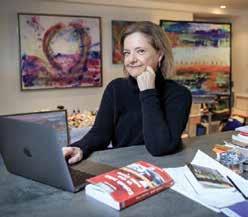
Cally Jordan, LLB’77, BCL’80, has published International Capital Markets: Law and Institutions, 2nd ed. (Oxford University Press, 2021). Among those who provided research support for the book are Lorena Cristi, LLM’19, and BCL/JD’20 alumni Fatima Anjum, Laurent Crépeau, Scott Labove, Kevin Pinkoski, Rebecca Schur, and Elgin Taing.
Rick Goossen, BCL’85, LLB’85, is the author of Public Speaking Laws of Success: For Everyone and Every Occasion (Morgan James Publishing, 2021), which includes anecdotes about Blaine Baker, Paul-André Crépeau, and the Rt. Hon. David Johnston, PC, CC, CMM, COM, CD.
The Honourable ALISON HARVISON YOUNG, BC’83, LLB’83, a judge of the Ontario Superior Court of Justice, was appointed to the Court of Appeal for Ontario. Justice Harvison Young was a member of the Faculty of Law of McGill University from 1988-1998, teaching in the areas of public, private and family law.
SHARON G. DRUKER, Ad E, BCL’85, LLB’85, was named Advocata Emerita by the Barreau du Québec. Druker is a partner at Robinson Sheppard Shapiro, where she focuses on corporate finance, mergers, acquisitions & divestitures, equity, inventory and equipment financing, commercial real estate and other transactional work.
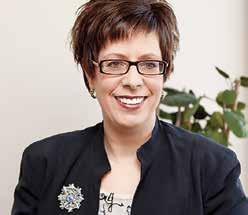
FOCUS LAW / 2021-2022 / M C GILL UNIVERSITY 36
ALUMNOTES
In Memoriam
Claude Marseille, Ad E, BCL’86, LLB’86, qui traite les litiges dans les domaines du droit commercial et des sociétés, des actions collectives, du droit de la construction et des recours d’actionnaires chez Blakes Cassels & Graydon, a été sélectionné pour le prix « Plaideur de l’année au Québec » par Benchmark Litigation Canada.
Josée Noiseux, BCL’89, a été nommée présidente du conseil d’administration de la Société du Palais des congrès de Montréal. Elle siège également aux conseils d’administration de Tennis Canada et du Musée d’art contemporain de Montréal.
Jennifer Stoddart, OC, OQ, Ad E, BCL’81, LLD’15, a strategic advisor in Fasken’s Privacy and Cybersecurity Group, was made an Officer of the Ordre national du Québec. Stoddart sits on the Committee on the responsible conduct of research, reporting to the Chief Scientist of Quebec, and on the board of Génome Québec.
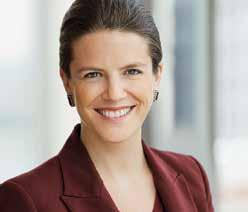
The 1990s
MICHAEL NOVAK, BCL’80, LLB’81, was named Governor Emeritus of Concordia University’s Board of Governors in March 2021, after a decade of service. Novak was a member of its executive committee, audit committee and finance committee, chairing the latter from 2018 to 2020.

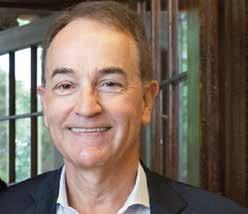
Janice Naymark, BCL’86, LLB’86, conseillère juridique pour RaichLegal, a été nommée par la ministre du Développement économique et des Langues officielles à un comité d’experts sur la langue de travail et la langue de service des entreprises privées de compétence fédérale. Le comité avait pour mandat de formuler des recommandations pour moderniser la Loi sur les langues officielles.
Brian Bronfman, OQ, BCL’91, LLB’91, a été nommé officier de l’Ordre national du Québec pour son travail de longue haleine visant à stimuler la diversité et l’inclusion, à prévenir la violence et à promouvoir la paix. Il est président de la Fondation de la famille Brian Bronfman.
JULIE BÉDARD
Americas, where she practices in four languages. She represents clients in connection with litigation and arbitration proceedings throughout the world, raising disputes on governing law, jurisdiction, the enforcement of arbitration agreements, extraterritoriality and international judgment enforcement.
The Honourable ALISON HARVISON YOUNG, BC’83, LLB’83, a judge of the Ontario Superior Court of Justice, was appointed to the Court of Appeal for Ontario. Justice Harvison Young was a member of the Faculty of Law of McGill University from 1988-1998, teaching in the areas of public, private and family law.
The Hon. LOUIS CHARETTE, BCL’94, LLB’94, was appointed to the Superior Court of Quebec for the District of Montreal. The former partner at Lavery de Billy is listed in Best Lawyers in Canada 2021 as a leading practitioner in aviation, insurance, transportation, and product liability. He received the Lawyer of the Year award in the field of transportation law in 2020. He has lectured on civil procedure at the Faculty.
The Hon. Jan Brongers, BCL’94, LLB’94, was appointed to the Supreme Court of British Columbia in April. As a civil litigator, Justice Brongers gained experience in a wide variety of Crown litigation files, notably in administrative, Indigenous and constitutional law. After his studies, he clerked at the Federal Court of Appeal for the Hon. James K. Hugessen, BCL’57. He was the Senior General Counsel at the Regional Director General’s Office of Justice Canada in British Columbia.
Danielle Chalifoux, Ad E, LLM’99, qui est à la direction de l’Institut de planification des soins du Québec et œuvre dans les domaines du droit de la santé et des personnes âgées, a reçu la distinction Advocata Emerita du Barreau du Québec.
37
, BCL’96, LLB’96, heads Skadden’s International Litigation & Arbitration Group for the
LAVERNE JACOBS, BCL’99, LLB’99, was this year’s recipient of the Canadian Bar Association’s Touchstone Award for her work promoting equality in the legal profession, the judiciary and the legal community in Canada. Professor Jacobs has dedicated her career to teaching, researching and writing about law and disability, administrative law and human rights. She is the founder and director of The Law, Disability and Social Change Project at the University of Windsor’s Faculty of Law.
Hugo Cyr, Ad E, BCL’97, LLB’97, a reçu la distinction Advocatus Emeritus du Barreau du Québec. Le professeur Cyr, qui est membre du Département des sciences juridiques, a par ailleurs été doyen de la Faculté de science politique et de droit de l’UQÀM de 2015 à 2020.
The Hon. Chile Eboe-Osuji, LLM’92, retired as President of the International Criminal Court (ICC) in The Hague and returned to Canada for a term at Ryerson University as Distinguished International Jurist.
Carolena Gordon, BCL’91, LLB’91, was elected Senior Partner at Clyde & Co. She is the first partner from outside the UK and the first woman to hold the position. Based in Montreal, Gordon is an experienced litigator focused on dispute resolution and risk management for a range of commercial and insurance clients, with a special interest in the infrastructure sector.
L’hon. Mahmud Jamal, BCL’93, LLB’93, a été nommé à la Cour suprême du Canada, après avoir siégé à la Cour d’appel de l’Ontario. Il a remplacé la juge Rosalie Abella, LLD’99. Le juge Jamal a ainsi rejoint deux autres membres de notre communauté diplômée : la juge Sheilah Martin, BCL’81, LLB’81, et notre ancien doyen, le juge Nicholas Kasirer, BCL’85, LLB’85, nommés respectivement en 2017 et 2019. À lire, page 28.
Lindsay Matthews, BCL’96, LLB’96, joined the management team of integrated payment technology company Nuvei as General Counsel and Corporate Secretary. Previously, she was VP, General Counsel, and Corporate Secretary at Gildan Activewear.

The Hon. Jill Presser, LLB’94, was appointed to the Ontario Superior Court of Justice. With a practice focused on appellate criminal defence, mental health, digital privacy and AI, Presser was principal lawyer at Presser Barristers in Toronto, staff lawyer to Stephen Goudge on the Inquiry into Pediatric Forensic Pathology in Ontario and part-time prosecutor for the Attorney General of Ontario.
SARAH QADEER, BCL’96, was named Deloitte’s Chief Legal Officer and a member of the firm’s executive team. Qadeer is responsible for leading Deloitte’s legal strategy and for overseeing the in-house legal and corporate governance team for Canada and Chile. She continues to serve as president of Legal Leaders for Diversity.
L’hon. MARIE-ANDRÉE VERMETTE, BCL’97, LLB’97, a été nommée juge de la Cour supérieure de justice de l’Ontario. Avant sa nomination, la juge Vermette était associée au sein du cabinet WeirFoulds à Toronto, où elle a exercé dans les domaines du contentieux civil, commercial et du droit public pendant près de 20 ans. Elle a présidé le groupe de gestion du contentieux commercial du cabinet.
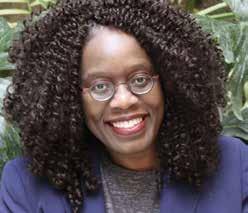
Amee Sandhu, LLB’98, who heads Lex Integra, has joined the roster of experts of the Canada Climate Law Initiative (CCLI). The CCLI’s mission is to ensure Canadian companies understand their fiduciary obligations with respect to climate change and have the resources to govern in the area of climate-related financial risks and opportunities.

ALUMNOTES
FOCUS LAW / 2021-2022 / M C GILL UNIVERSITY
38
The Hon. Daniel Urbas, BCL’91, LLB’91, a litigator, arbitrator and mediator with over 25 years of dispute resolution experience with a solo practice, was appointed to the Superior Court of Quebec for the District of Montreal. He replaces Justice Carol Cohen, BCL’82, who has elected to become a supernumerary judge.
Marko Pavliha, DCL’92, co-authored and edited a book entitled Transport Law on Passenger Rights which forms part of the book series IMLI Studies in International Maritime Law. Professor Pavliha is also a longstanding Visiting Professor at IMLI and a Member of the IMLI Governing Board.
The 2000s
Catherine Bleau, BCL/LLB’04, a été nommée directrice générale de Monette Barakett Avocat. Elle participe au rayonnement, à la planification et à la gestion des risques du cabinet, ainsi qu’au développement professionnel. Elle est également présidente (comité des directeurs généraux) de l’Association québécoise des administrateurs juridiques.
Lauren Chang MacLean, BCL/LLB’09, was named Director of Legal Services at Metrolinx, after working as a Legal Counsel (Labour, Employment & Human Rights) for three years. She is the co-founder of WillYouMakeItBetter. com, an anti-racism website where contributors can reclaim the narrative and demand better, and where readers can learn and empathize.
Aaron Chase, BCL/LLB’05, has launched a law firm. Based in Brooklyn, Aaron Chase LLC offers clients legal risk analysis and research solutions, with the purpose of providing an objective assessment of a case’s likelihood of success in litigation.
Mélanie Dugré, BCL’00, LLB’00, présidente du comité de relations avec les membres du Barreau de Montréal depuis 2013, s’est vue décerner le Prix Pierre-Fournier du Barreau de Montréal de l’année 2020 par le Bâtonnier sortant, Alexandre Forest, BCL/LLB’10. Me Dugré est VP adjointe et conseillère juridique principale chez Canada Vie. Gregory T. Gowe, LLB’01, launched a fundraising initiative for ALS Action Canada. Gowe who was a member of the legal department at Telus Communications Inc. in British Columbia for 11 years was diagnosed with Amyotrophic Lateral Sclerosis in 2019 and has been working tirelessly to raise funds and awareness ever since. The campaign (ALSactioncanada.org/donate/) had raised $75,000 by July 2021.
Justin Howell, BCL/LLB’04, was named to the board of Canadian National Railway in March 2021. Howell is a Senior Investment Manager at BMGI, which manages the assets of Cascade Investment LLC,
CN’s largest shareholder. He has in-depth knowledge of international financial and capital markets and extensive international experience in corporate finance, investment banking and M&A.
Robert Israel, BCL/LLB’06, who practices criminal and penal law at Battista Turcot Israel Corbo, was named an adjunct professor at the Faculty. Besides teaching at the Faculty, he has been coaching law students participating in the Guy-Guérin Cup/Sopinka Moot with great success.
Amar Khoday, LLM’08, DCL’14, is an associate professor at the University of Manitoba’s Faculty of Law. Khoday, who won the 2020 Barney Sneiderman Award for Teaching Excellence in Law, recently published “Ending the Erasure? Writing Race into the Story of Psychological Detentions Examining R. v. Le” (Supreme Court Law Review), and “Every Moment Counts: The Legal Value of Time in Canadian Criminal Law and Procedure” (Criminal Law Quarterly).
L’affaire Camara : Pour arriver à un bon diagnostic
Plusieurs membres de notre communauté ont signé une lettre ouverte dans le journal La Presse en février 2021 suite à l’arrestation de Mamadi Camara, un doctorant noir arrêté à tort par des policiers du SPVM. La lettre a fait le point sur le mandat d’enquête du juge Dionne, déclarant que « le mandat d’une commission d’enquête identifie la question qui sera posée. Si le mandat formule la mauvaise question, le commissaire donnera la mauvaise réponse et arrivera avec un mauvais diagnostic ».
Parmi les signataires, on compte les membres du corps professoral suivants:
· Richard Janda
· Marie Manikis
· Nandini Ramanujam
· Colleen Sheppard
· Frédéric Mégret
· Vrinda Narain
· Robert Leckey
· François Crépeau
· Evan Fox-Decent
· Alana Klein
Ainsi que des membres de notre communauté diplômée :
· Gassim Bangoura, BCL’01, LLB’01
· Genevieve Painter, BCL/LLB’06
· Alexandre Bien-Aimé, BCL/LLB’10
· Hugo Cyr, BCL’97, LLB’97
· Pearl Eliadis, BCL’85, LLB’85
· Carle Jane Evans, BCL/LLB’14
· Finn Makela, BCL/LLB’04
· Derek McKee, BCL/LLB’06
· Sébastien Lebel-Grenier, BCL’02, LLB’02
39
Primés par la Fondation Pierre Elliot Trudeau
ÉTIENNE COSSETTE-LEFEBVRE, BCL/LLB’14, et RAPHAËL GRENIER-BENOÎT, BCL/LLB’19, sont parmi les 15 personnes sélectionnées pour les bourses de leadership 2021 de la Fondation Pierre Elliott Trudeau. Cossette-Lefebvre est doctorant à la Faculté de droit de l’Université de Toronto, tandis que Grenier-Benoît est doctorant à la Faculté de droit de l’Université d’Oxford.
Marie Christine Kirouack, Ad E, BCL’91, a été nommée au poste d’Ombudsman indépendante par l’Archevêché de Montréal. Elle recevra et assurera le suivi de toute plainte d’abus ou d’autres formes de comportements inappropriés envers des membres du clergé, du personnel et des bénévoles au sein de l’Église catholique à Montréal.
Doree Levine, BCL/LLB’04, a partner at Robinson Sheppard Shapiro, is serving as president of the Lord Reading Law Society for 2021–2022. Her practice centres on family law as well as on estates, wills and trusts. She previously served as co-chair of the Faculty’s Young Alumni Board. Marcos Ludwig, LLM’07, was made equity partner of leading Brazilian law firm Veirano Advogados. Based in the Rio de Janeiro office, he is co-head of the practice area of Infrastructure & Projects and head of the firm’s China Desk. Ludwig is a listed arbitrator in Brazil (CBMA), China (CIETAC and SHIAC) and the Netherlands (CAfA/NAI).
L’honorable Geeta Narang, BCL’00, auparavant associée chez Narang & Associés à Montréal et chargée de cours à la Faculté, a été nommée juge de la Cour supérieure du Québec (district de Montréal).

Jeff John Roberts, BCL/LLB’05, left his tech reporter job at Fortune magazine after five years and is now executive director of Decrypt Media, which aims to demystify blockchain and cryptocurrency.
Juan Carlos Salazar, LLM’00, took up the role of Secretary General of the International Civil Aviation Organization (ICAO), the Montreal-based United Nations specialized agency responsible for aviation safety and security. He was Director General of the Colombia Civil Aviation Authority, and previously served as a Senior Advisor to the United Arab Emirates (UAE) Civil Aviation Authority.
Samuel Singer, BCL/LLB’09, LLM’11, an assistant professor at the University of Ottawa, was awarded the Canadian Law and Society Association’s Article Prize for his paper, “Trans Rights Are Not Just Human Rights: Legal Strategies for Trans Justice.” The prize committee praised his paper for being “important, timely, and contribut[ing] not just to the scholarship on issues affecting trans people, but also to the body of literature on legal and extralegal strategies for social change more broadly.” See story on page 12. Singer also received the 2021 Ian Kerr Award for Excellence in Teaching, English Common Law Program.
TJ Schmaltz, BCL/LLB’02, co-authored the fourth edition of Employment Law for Business and Human Resources Professionals: Alberta and British Columbia (Emond, 2020). He continues to work as the Chief People & Legal Officer for Prospera Credit Union in Vancouver, while also teaching part-time at several postsecondary institutions.
The 2010s & 2020s
Sabaa Ahmad Khan, DCL’16, is Director General for Quebec and Atlantic Canada and climate portfolio lead at the David Suzuki Foundation. Khan was previously senior researcher at the Center for Climate Change, Energy and Environmental Law in Joensuu, Finland.ro
Souhila Baba, BCL/JD’20, joined the Quebec Community Groups Network as a legal and policy researcher. Previously, she was a research lawyer at the Quebec Court of Appeal (Quebec City section).
DINA AWAD, BCL/LLB’11, is the recipient of a 2021 Precedent Setter Award. A partner at Dentons Canada, she has launched a program that pairs specially trained Denton colleagues with child refugees to help them, pro bono, in navigating the Canadian legal system. For two years, she chaired the Roundtable of Diversity Associations, an umbrella organization that advocates for a more diverse, inclusive profession.
40 ALUMNOTES FOCUS LAW / 2021-2022 / M C GILL UNIVERSITY
JEANSIL BRUYÈRE, BCL/LLB’16, left his position as Policy & Communications Director at Philanthropic Foundations Canada to join the Immigration Refugee Board of Canada in the Refugee Protection Division as an asylum seeker adjudicator/decision maker.
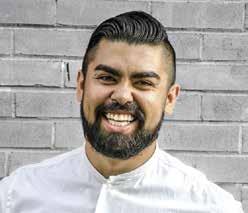
L’hon. Christine Baudouin, LLM’12, anciennement juge de la Cour supérieure du Québec pour le district de Montréal, a été nommée juge de la Cour d’appel du Québec. Avant de rejoindre la magistrature, elle a exercé comme avocate et associée dans plusieurs cabinets, dont Heenan Blaikie et Casavant Mercier Avocats. Ses domaines de pratique comprenaient le droit civil, le droit de la santé, le droit administratif et le droit du travail et de l’emploi.
Éloge Butera, BCL/LLB’12, joined federal Minister of Public Services and Procurement Anita Anand’s office as Senior Policy Advisor, returning to Parliament Hill after a year away during which he was Director of the African Centre of Excellence for the Dallaire Institute for Children, Peace, and Security, at Dalhousie University.
Laura Cárdenas, BCL/LLB’18, joined IMK LLP as an associate, alongside the firm’s many McGill Law alumni. She is a litigator in the areas of civil and commercial litigation, competition law and class actions. After clerking at the Supreme Court of Canada in 2019–2020, she practiced at DLA Piper.
Rokeya Chowdhury, LLM’13, DCL’21, is Senior Corporate Mobility Advisor at New Era Immigration Law, a Montreal-based boutique law firm specializing in U.S. and Canadian Corporate Immigration, supporting clients with a variety of immigration matters, such as visas.
Alyssa Clutterbuck, BCL/LLB’16, joined WeirFoulds as an associate in the Municipal Law Practice Group. Previously, she was a litigation associate at Osler, Hoskin & Harcourt in Toronto.
Laura Crestohl, BCL/LLB’15, joined the Policy, Research and Parliamentary Affairs Directorate of the Office of the Privacy Commissioner of Canada (OPC) as a Senior Policy and Research Analyst. She had started at the OPC in 2019 as a Senior Advisor in Business. She was also elected as the Secretary of the Board of Directors for the Toronto Outdoor Picture Show, a non-profit dedicated to sharing high quality, diverse and engaging outdoor cinema to communities across Toronto.
Lawrence David, BCL/LLB’14, serves as Legal Counsel in the federal Department of Justice in Ottawa in the area of public safety and emergency preparedness. After earning his LLM at Harvard in 2018, he published Stare Decisis, the Charter and the Rule of Law in the Supreme Court of Canada (LexisNexis, 2020). He is the co-author of the 2021 edition of the volume on damages for Halsbury’s Laws of Canada.
VIVA DADWAL, BCL/LLB’19, joined King & Spalding’s New York offices as an associate in their Trial & Global Disputes and International Arbitration & Litigation groups in June 2019. Her practice involves commercial and investment treaty arbitrations, as well as enforcement proceedings before U.S. courts.
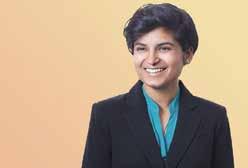
United at Unity
WILLIAM BUCKWELL, BCL/LLB’18, is Corporate Counsel (Ad Tech & Monetization) at Unity Technologies, after two years as Contracts Manager and Negotiator.
ANDREA GOMEZ GRANADOS, BCL/LLB’18, joined Unity Technologies as Legal Counsel. She was previously Contracts Manager and Negotiator at Bombardier.
VICTORIA M. WOO, BCL/LLB’19, joined Unity as Contracts Manager and Negotiator after articling at Baker Mackenzie and completing an LLM at Cornell Law School.
Unity Technologies produces a platform used by game developers, artists, architects, automotive designers and filmmakers to create and operate real-time 3D content.
41
Tanya (Toni) de Mello, BCL/LLB’11, received the Edward P. Bullard Distinguished Alumna Award from the Princeton School of Public and International Affairs. She is Assistant Dean of Students at Ryerson University’s Lincoln Alexander School of Law, where she is responsible for Admissions, Careers and Student Experience.
Balarama Holness, BCL/JD’20, est candidat à la mairie de Montréal pour un nouveau parti, Mouvement Montréal. En 2019, la pétition lancée par l’ex-candidat municipal dans Montréal-Nord et ex-joueur des Alouettes a poussé la Ville de Montréal à mettre sur pied une consultation publique sur le racisme systémique.
MATHIEU HENRI YVES JACQUES, LLM’11, avocat plaidant au ministère de la Justice du Québec, a entamé un mandat d’un an à titre de président du Jeune Barreau de Montréal.
Jean-Frédéric Hübsch, BCL/LLB’14, is pursuing a PhD in law at the University of Ottawa, where he is a member of the Interdisciplinary Research Laboratory on the Rights of the Child, after six years as counsel at the offices of the Ontario Ombudsman.

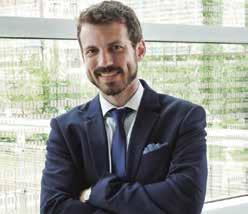
ANDREW HODHOD, BCL/LLB’12, is a partner at Borden Ladner Gervais. His practice focuses on all aspects of lending, leveraged finance, secured transactions and restructuring. He represents clients in connection with private and public financing, including syndicated and cross-border transactions, acquisition and leveraged financing and asset-based lending transactions. in Chicago.
Alexandre Forest, BCL/LLB’10, qui œuvre au sein des groupes de Réorganisation, faillite et insolvabilité et de Litige commercial de Gowling WLG Montréal, a reçu le Prix Reconnaissance John Molson de la Jeune Chambre de Commerce de Montréal pour son leadership et une implication citoyenne exceptionnelle. Il a été le Bâtonnier du Barreau de Montréal en 2019-2020.
Moses Gashirabake, BCL/LLB’17, launched Mo Gashi & Partners, a commercial advising and investing group based in Ottawa that supports clients in various stages of the financial investment value chain. Gashirabake continues to serve as Chair, Finance and Audit Committee, at the Canadian Race Relations Foundation.
Alix Génier, BCL/LLB’19, a rejoint Récolte, un collectif qui vise à mettre en place des systèmes alimentaires locaux justes tout en soutenant l’économie locale et l’environnement.
Alexandra R. Harrington, DCL’15, is the founder and executive director of the Center for Global Governance and Emerging Law, and the Research Director of the Centre for International Sustainable Development Law. She was the 2018–2019 Fulbright Canada Research Chair in Global Governance at the Balsillie School of International Affairs. Currently a visiting professor at the Albany School of Law, Harrington published International Law and Global Governance: Treaty Regimes and Sustainable Development Goals Implementation (Routledge, 2021).
Guillaume Laganière, LLM’13, DCL’20, a reçu le prix d’excellence de l’Association des professeures et professeurs de droit du Québec pour sa thèse doctorale, complétée sous la supervision de la professeure Geneviève Saumier, BCL’91, LLB’91, Chaire Peter M Laing QC de droit. Il actuellement professeur au Département des sciences juridiques de l’UQÀM.
CINDY KOU, BCL/LLB’11, is the recipient of a 2021 Precedent Setter Award. An associate at Gowlings WLG, Kou is a champion of inclusion in the legal profession. She co-hosts the Diversonomics podcast, which spotlighted systemic anti-Black and anti-Indigenous racism in Canada, and the role lawyers play in creating, maintaining and dismantling systemic barriers.

ALUMNOTES 42 FOCUS LAW / 2021-2022 / M C GILL UNIVERSITY
Aurélie Lanctôt, BCL/LLB’17, a reçu le prix d’excellence de l’Association des professeures et professeurs de droit du Québec pour son mémoire de maîtrise complété à l’Université de Montréal. Journaliste et essayiste engagée, elle signe une chronique hebdomadaire dans Le Devoir. Elle entame des études doctorales à la Faculté de droit cet automne.
Malcolm Lavoie, BCL/LLB’12, is a doctoral candidate (SJD) at Harvard Law School and Frank Knox Memorial Fellow, where the focus of his research is on links between property law and the collective interests of minority cultural groups, including Indigenous societies.
The Shopify Crew
SIMONE A. AKYIANU, BCL/LLB’18, is Legal Policy Specialist at Shopify after a year as a lawyer for the Canadian Human Rights Commission.
RACHELLE BASTARACHE, BCL/LLB’17, is Associate Legal Counsel, Regulatory Affairs & Enforcement at Shopify, where she has been working for over three years.
NICHOLAS CAIVANO, BCL/LLB’13, joined Shopify as Legal Policy Specialist, Trust & Safety. He was previously a policy specialist in professional conduct and regulatory affairs at the Royal College of Dental Surgeons of Ontario.
JEANELLE DUNDAS, BCL/LLB’17, is Legal Counsel, Product and Commercial, at Shopify, where she has worked since November 2018.
SAM GREGG-WALLACE, BCL/LLB’15, is VP Strategic Initiatives & Chief of Staff at Shopify after three years serving as Chief of Staff to the President & COO.
, BCL/LLB’03,
The Honourable ALISON HARVISON YOUNG, BC’83, LLB’83, a judge of the Ontario Superior Court of Justice, was appointed to the Court of Appeal for Ontario. Justice Harvison Young was a member of the Faculty of Law of McGill University from 1988-1998, teaching in the areas of public, private and family law.
ANNA MCINTOSH, BCL/LLB’18, a staff lawyer at Ecojustice in Calgary (Moh’kins’tsis), was in court this year to challenge the province’s public inquiry into “anti-Alberta” energy campaigns. She is also representing Ecojustice against Alberta’s challenge to the federal Impact Assessment Act, a law that shapes decision-making on large projects with environmental impacts.
Jean-Sébastien MacAdam, BCL/LLB’18, a member of the bars of Quebec and Ontario, has left private practice to work as a lawyer with the National Judicial Institute, based out of Montreal.mpacts.
André Moreau, BCL/LLB’19, has taken up the role of Circumpolar Affairs Advisor for the Government of Nunavut. He was previously a Policy Analyst for the Controlled Substances and Cannabis Branch at Health Canada, after completing his articles with the National Judicial Institute.
Corey Omer, BCL/LLB’12, joined Davies Ward Phillips & Vineberg as a partner in the Dispute Resolution group of their Montreal office. He was previously in the New York office of an international law firm. Omer specializes in complex business litigation, class action suits, cybersecurity issues, insurance cases, mediations and regulatory investigations.
Emily Ann Painter, BCL/LLB’19, is counsel with the international assistance group at Justice Canada.
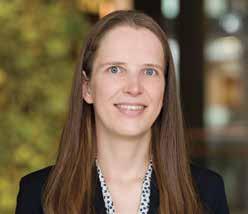
IVAN OZAWA OZAI, DCL’21, joined Osgoode Hall at York University as an Assistant Professor, where he researches and teaches national and international tax law and policy, with a focus on the intersection of tax law with legal theory and political philosophy.
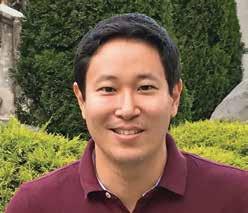
43
ERIN ZIPES
Shopify’s VP Assistant General Counsel and Corporate Secretary, recently launched Backbone Angels (www.backboneangels.com) with nine Shopify women colleagues. This angel collective invests in ventures founded by women and non-binary people with a focus on Black and Indigenous people and companies led by Women of Colour.
JAGTARAN SINGH, BCL/LLB’13, is legal counsel at the Ontario Human Rights Commission. His work focuses on the public interest inquiry into racial profiling and racial discrimination of Black persons by the Toronto Police Service. Before entering the public sector, he practiced commercial and civil litigation at McCarthy Tetrault, where he co-founded the Warren K. Winkler Class Actions Moot. He assisted in representing the Canadian Civil Liberties Association at the Supreme Court of Canada in Kazemi Estate v Islamic Republic of Iran, 2014 SCC 62.

Tiran Rahimian Bajgiran, BCL/JD’20, is completing an LLM at Harvard Law School, for which he received a John Peters Humphrey Fellowship from the Canadian Council on International Law, as well as a Frank Knox Memorial Fellowship. Previously, he clerked at the Constitutional Court of South Africa in Johannesburg, as well as for the Chief Justice of the Supreme Court of Canada.
Maithili Sagar, BCL/LLB’10, has launched KinderPass, an ed-tech startup in Dubai that offers a management solution to streamline all aspects of managing preschools, daycares and nurseries.
Bruno Savoie, BCL/LLB’18, moved to Dubai to work as an associate in the international arbitration of construction disputes group at Mayer Brown. Previously, he was an associate at BLG’s Toronto offices.
Éric St-Pierre, BCL/LLB’10, has been named a Climate Champion by the Canada Climate Law Initiative. St-Pierre is Executive Director of the Trottier Family Foundation, a private philanthropic
foundation. Under his leadership, the Foundation has transitioned its assets towards sustainable and impact investing, increased grants for climate change and helped build new initiatives that accelerate the transition towards a net-zero-carbon economy.

ALBA STELLA ZÚÑIGA RAMOS, BCL/LLB’15, se présente comme candidate au poste de conseillère municipale pour le district de Louis-Riel avec la coalition Ensemble Montréal. Précédemment, elle était avocate chez Mercier Leduc.

44 FOCUS LAW / 2021-2022 / M C GILL UNIVERSITY ALUMNOTES Connect with Dean Leckey and follow us at https://mcgill.ca/x/4jG @LawMcGill #McGillLaw @LawMcGill Connect with @LawMcGill - @DeanLeckey Gardez le contact ! Envoyez-nous vos suggestions de nouvelles et d’alumnotes à ebulletin.law@mcgill.ca Connect with us on social media for our latest news and events.
The Chancellor Day Circle
Named in honour of Charles Dewey Day, first chancellor of McGill University and, as one of the codifiers, a central figure in the civil law of Quebec, the Chancellor Day Circle was founded in 2017 to acknowledge the Faculty’s most significant donors. Admission to the Circle is bestowed on donors who have given $100,000 or more to the Faculty of Law.
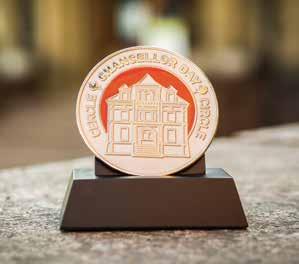
La Faculté de droit remercie les membres du Cercle Chancellor-Day pour leur soutien inestimable :
A. Jean de Grandpré, CC
Alex Kam-Wah Woo
The Amiel Foundation
Anna Yang & Joseph Schull
Ariel & Catherine Deckelbaum
Beaverbrook Canadian Foundation
Blake, Cassels & Graydon LLP
The Blema & Arnold Steinberg Foundation
BMO Financial Group
The Boeing Company
Borden Ladner Gervais LLP
Christopher Hoffmann & Joan Eakin
Clive & Barbara Allen & Family
The Chawkers Foundation
Colin Stephen Baxter & Rachel Ralston Baxter
David Johnston
David P. O’Brien, OC
David W. Binet
Davies Ward Phillips and Vineberg LLP
Donald E. Meehan
Donner Canadian Foundation
The Hon. E Leo Kolber, OC
Éric St-Pierre
Fasken
Fondation J A DeSève
Gregory J. David Hillel Rosen & Liane Feldman
Ian C. Pilarczyk
IMK LLP/S.E.N.C.R.L. Isabelle Marcoux, CM
James A. Robb, QC, Ad E James A. Woods
The Hon. James C K-Hugessen, CM Jordan & Caren Waxman
The Hon. L. Yves Fortier, PC, CC, OQ, QC Li Ka-Shing (Canada) Foundation
Marcel J. Arsenault & Cynda Collins-Arsenault Marlene & Joel King
Maryse D. Bertrand, Ad E, & William Brock, Ad E Masao Sekiguchi
McCarthy Tétrault LLP
The McConnell Foundation
McMillan S.E.N.C.R.L., s.r.l./LLP
Michael Novak & Kathleen Weil
Mitch Garber & Anne-Marie Boucher
Mitzi and Mel Dobrin Family
Nahum Gelber, CM, QC
Norton Rose Fulbright Canada LLP
Osler Hoskin & Harcourt LLP
Penny & Gordon Echenberg
Peter D. Nesgos
Philippe Lette Québecor inc
Richard Aftanas
Richard Bogoroch
Rio Tinto
Robert L. Katz & Christina H. Otto
Robert L. Raich & Marlene Raich
Robert Raizenne
Roderick A. Macdonald & Shelley Freeman
The late Roy L. Heenan, OC
Scott Henderson
Sophie Nappert
Stephen Allan Scott
Stephen Halperin & Andrea Morris Halperin
Stikeman Elliott LLP
Susan Wells Tunnell & David Tunnell
William Friedman
A future to match her ambition. Made by opportunity.
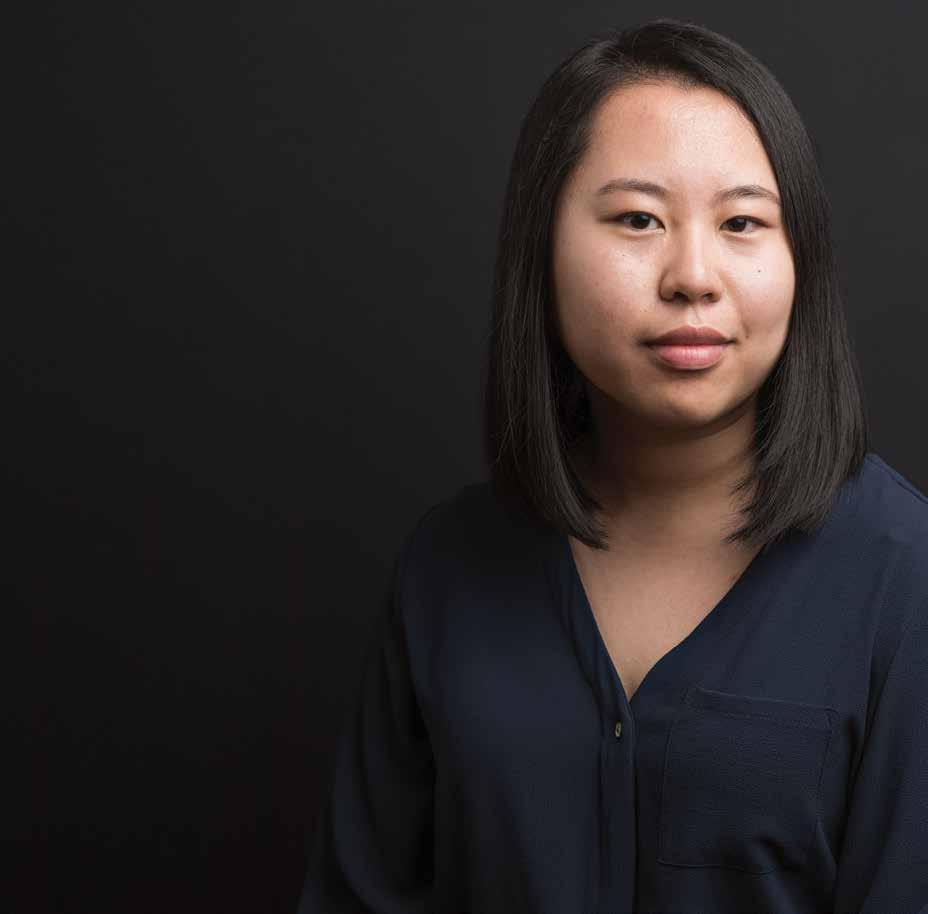
À l’avant-garde de la recherche et de la pédagogie, au service du bien commun. La Faculté de droit est prête à ouvrir le chemin.
Apprenez-en davantage à giving.mcgill.ca/law-focus
GG+A
Natacha Ngo Law student and Research Assistant to the H. Heward Stikeman Chair in the Law of Taxation, Prof. Allison Christians.
Canada Post Corporation Publications Mail Agreement 40613662
is proud to have played a role in the preparations for this campaign and we look forward to our continued partnership. We wish the McGill University community the greatest success.




























 by Claire Loewen
Members of the McGill Law community step up for trans, non-binary and intersex Quebecers
by Claire Loewen
Members of the McGill Law community step up for trans, non-binary and intersex Quebecers


 by Julia Dyck
by Julia Dyck









































 by Claire Loewen
by Claire Loewen


































